Laura González arrived to Barcelona 11 years ago from Monterrey Mexico. After studying Fine Arts and developing her practice as a painter, she has since committed her future to floristry. Her partner, Gregorio Fernández – better known as Gori – is originally from Mallorca and is trained as a motorcycle and antique car restorer. After moving to Barcelona he gravitated towards a long held interest: tailoring and fashion. Today Gori runs his own fashion line, Gori de Palma.
Gori and Laura’s partnership is intertwined in personal and professional spheres. Like many young creatives in Barcelona they decided to migrate to the Poblenou neighborhood, settling in a converted industrial space that functions as a home and work space. Despite the challenges of combining two activities under the one roof, the pair have succeeded in creating a functional and harmonious space where projects are accomplished and found objects are left scattered around the interior – one of Gori’s many hobbies is collecting objects. Whether it be some salvaged antique furniture, bicycles, floral arrangements or vintage motorcycles, the contents of their interior often depends on whatever the street or flea markets offer. The couple chats about their passions, city life, and the hope of one day making a rural change to lose distractions and have the expansive garden, perhaps even the pool, they have always dreamed of.
This story is featured in our second book, Freunde von Freunden: Friends, order within Germany here, or find the book internationally at selected retailers.
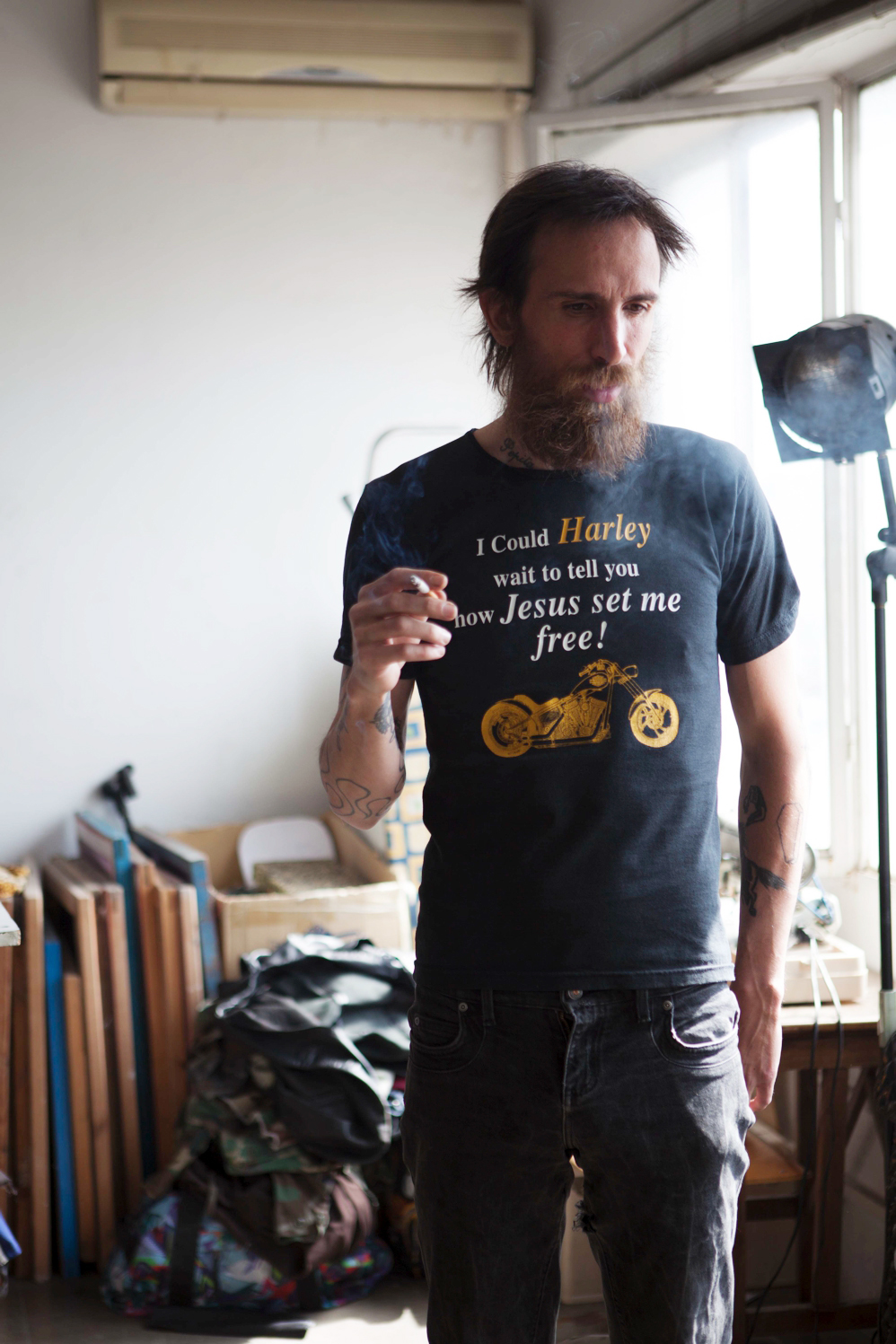
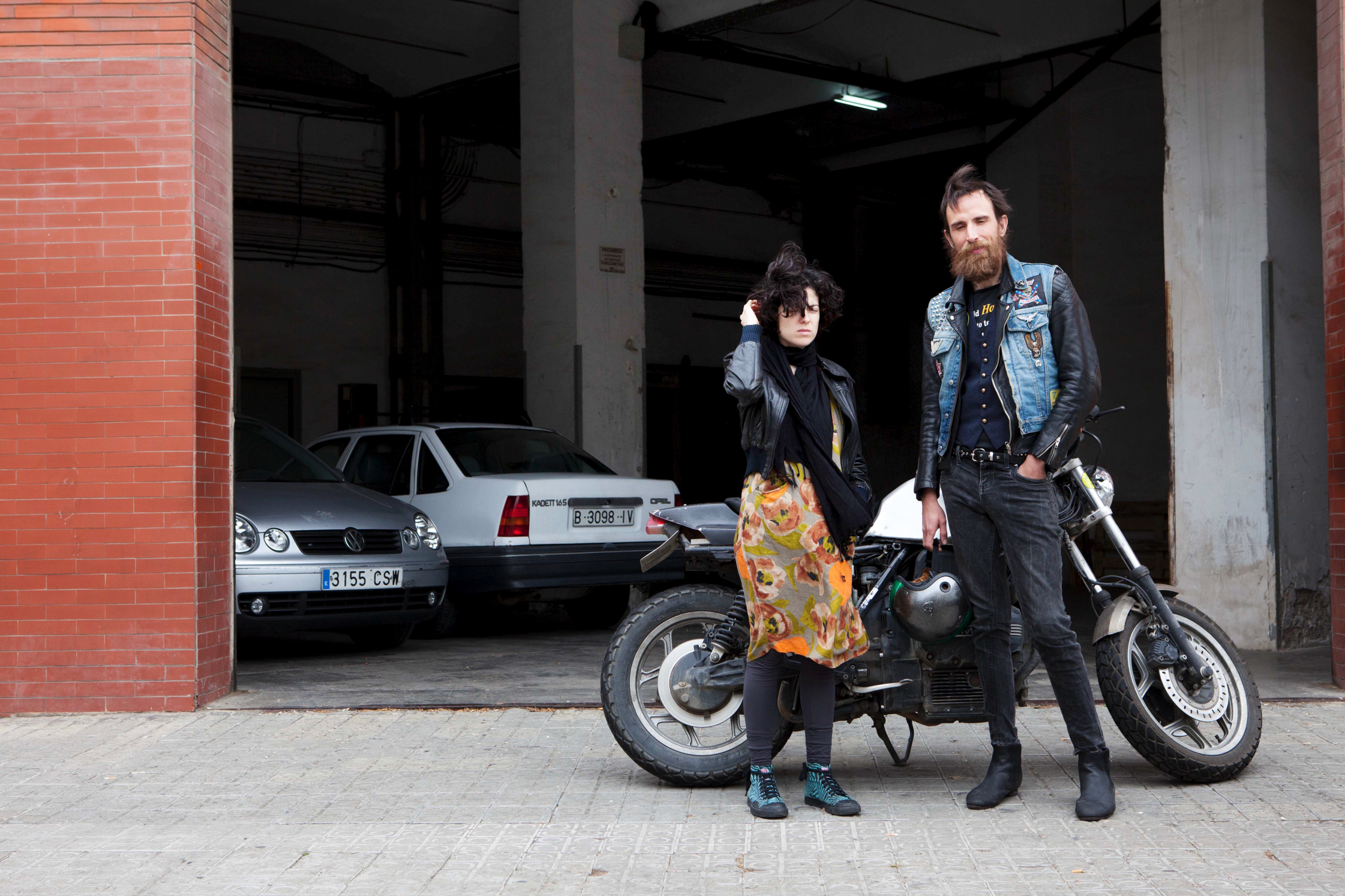
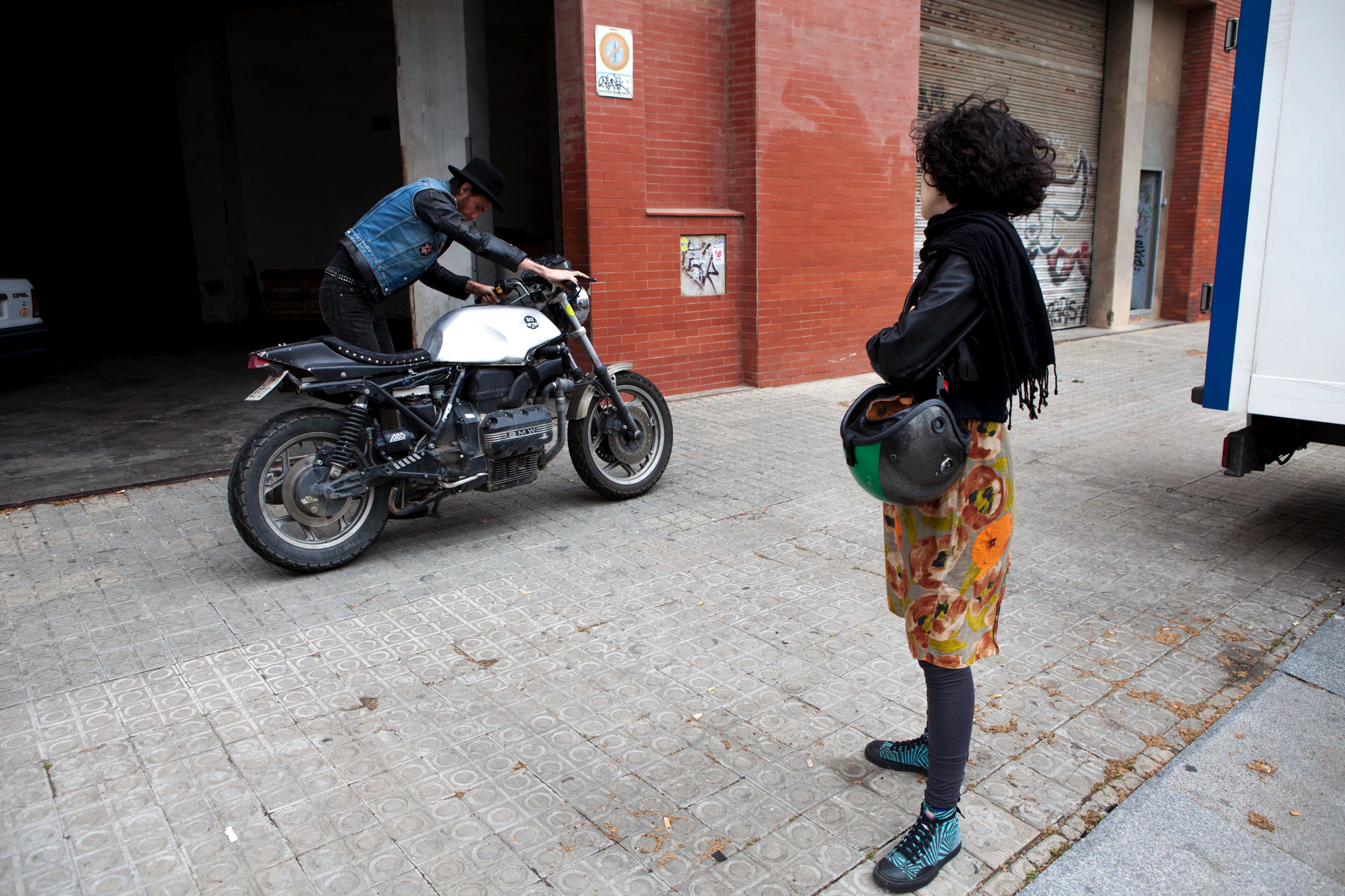
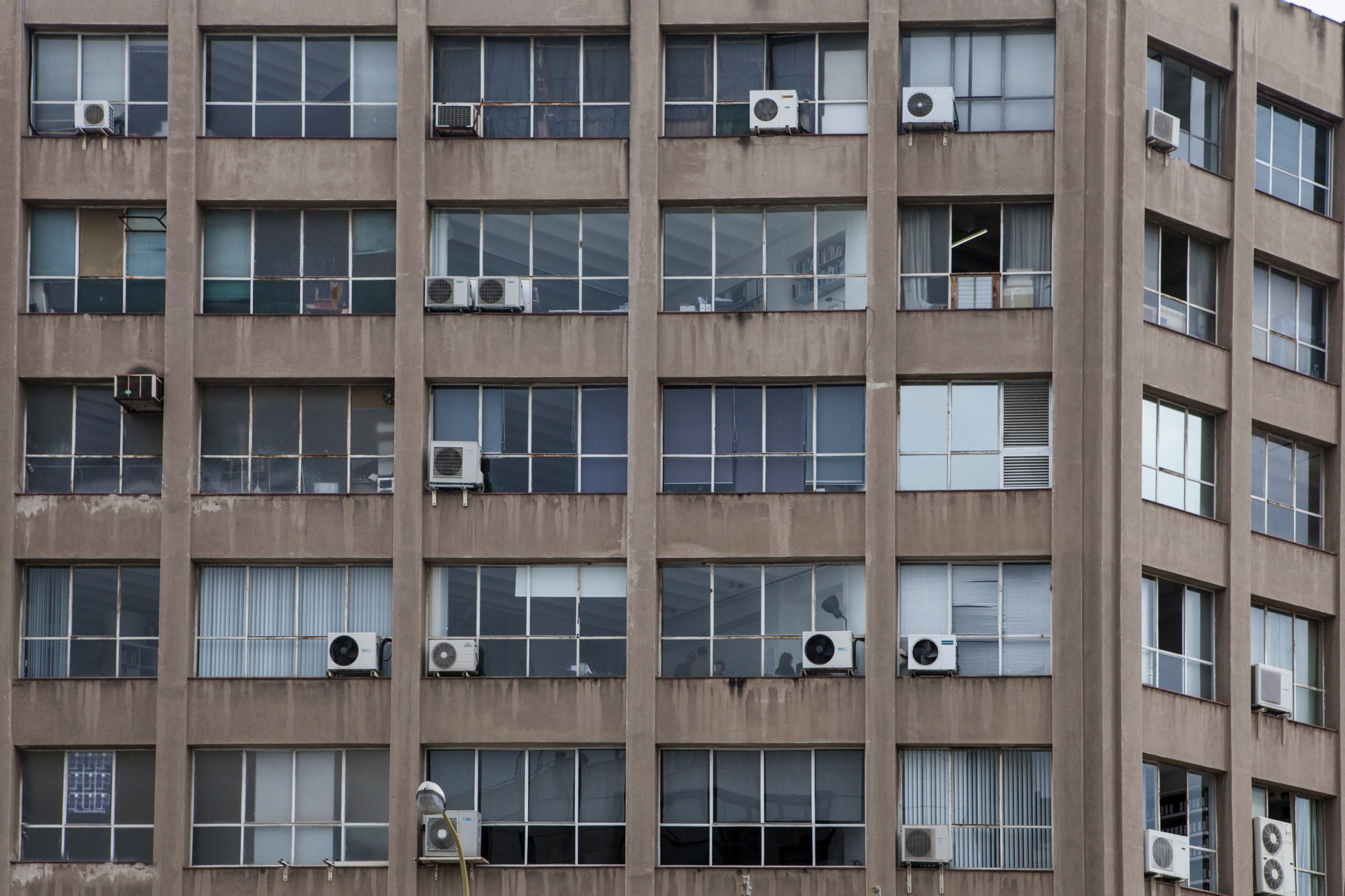
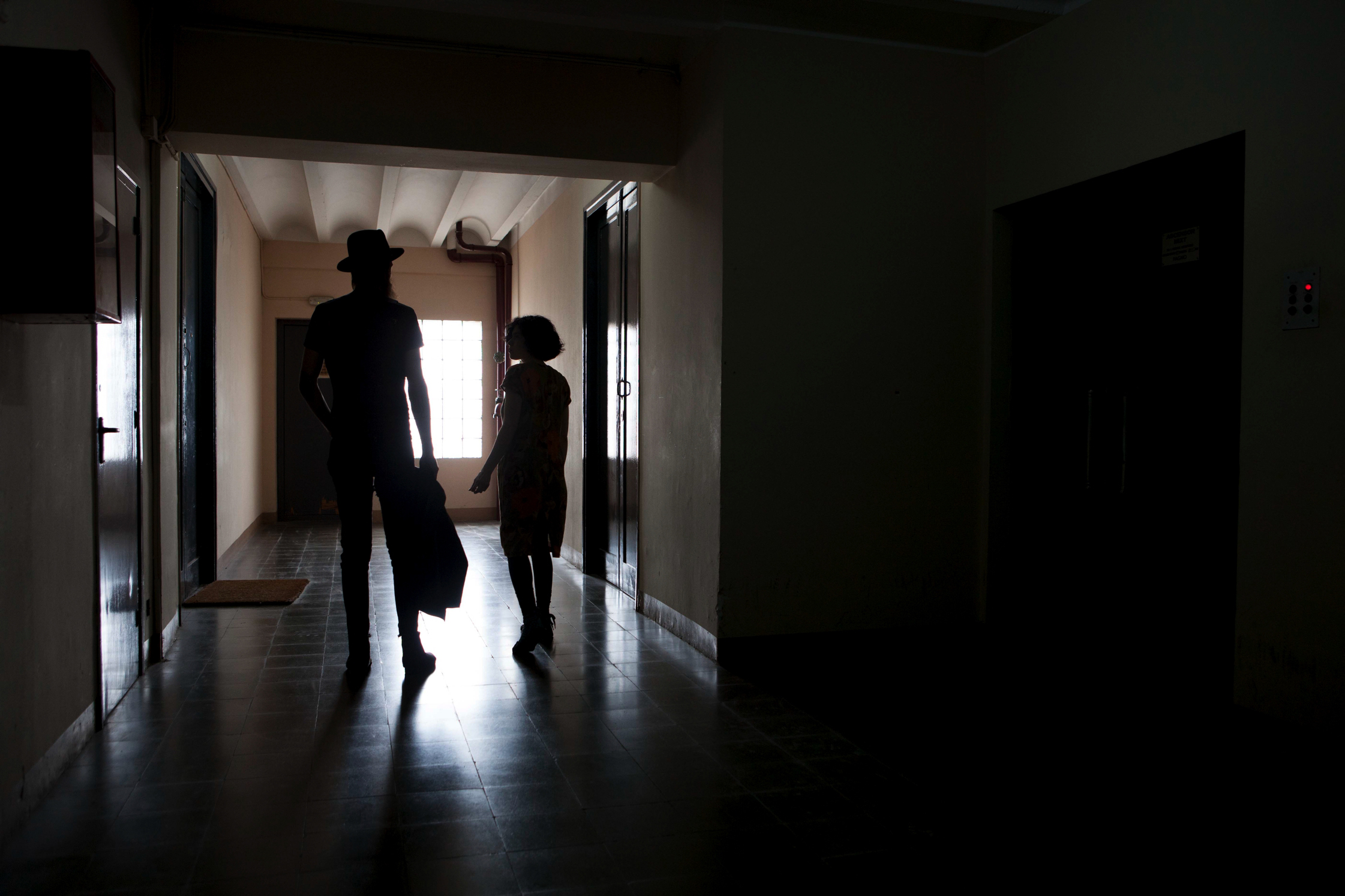

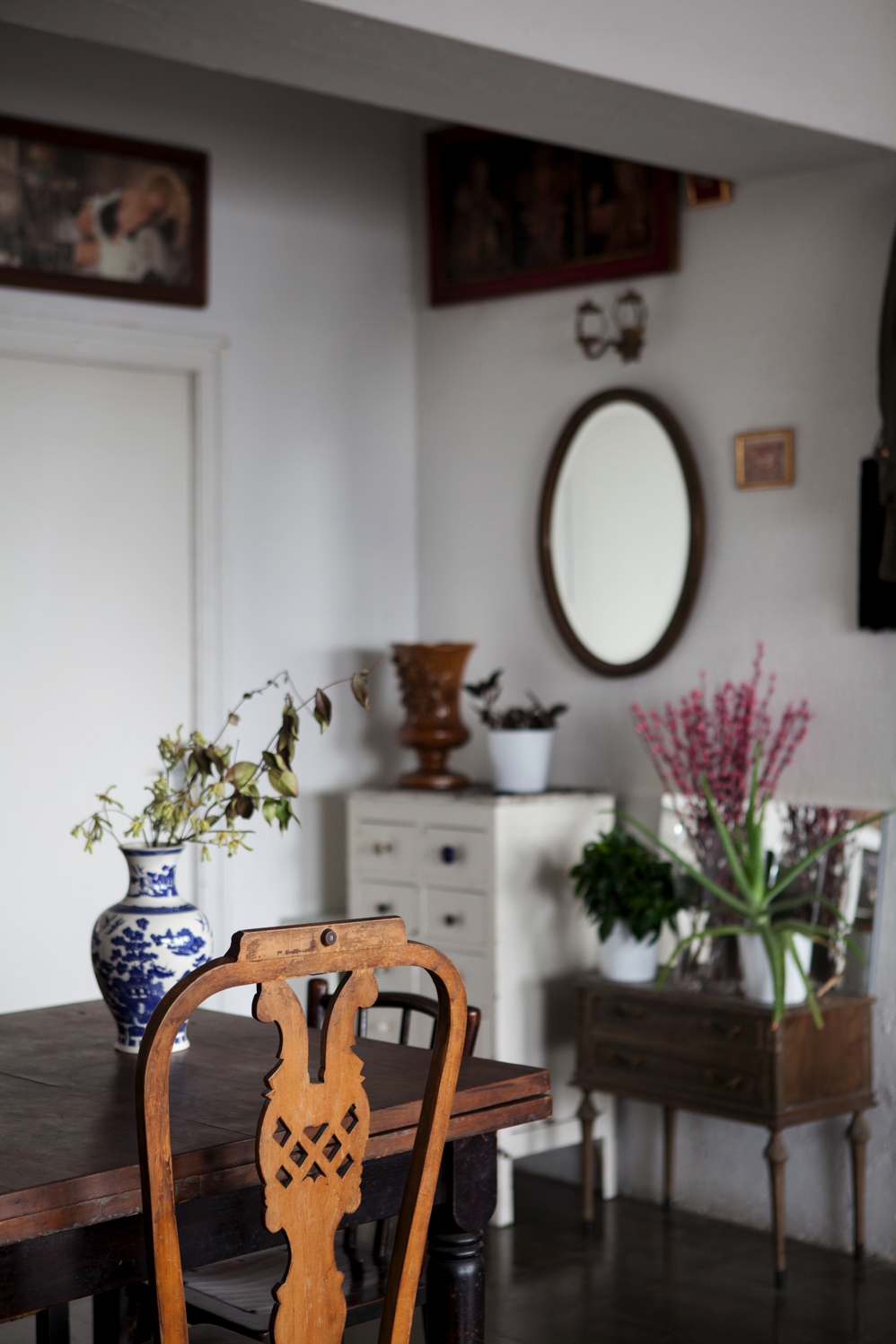
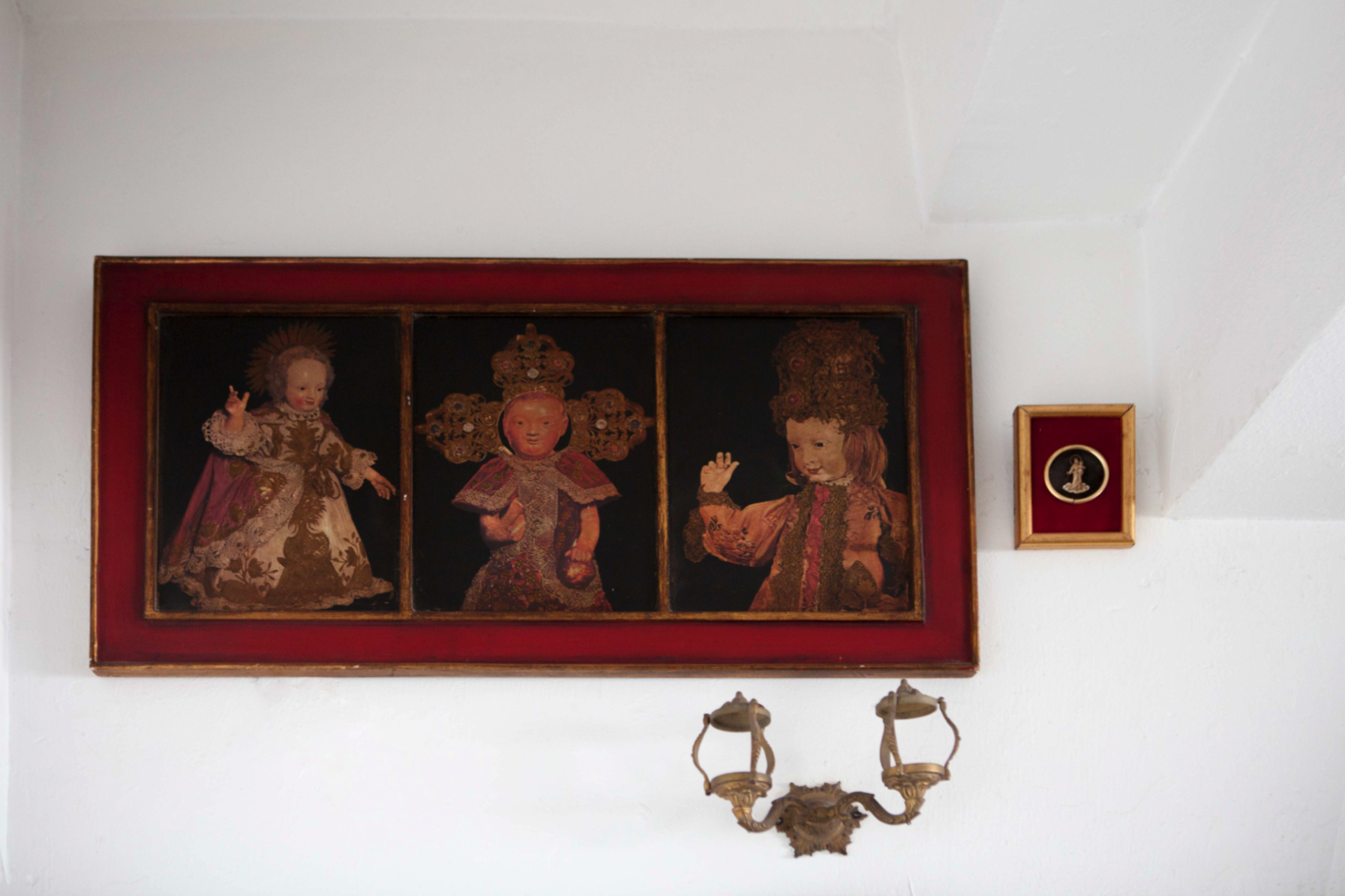
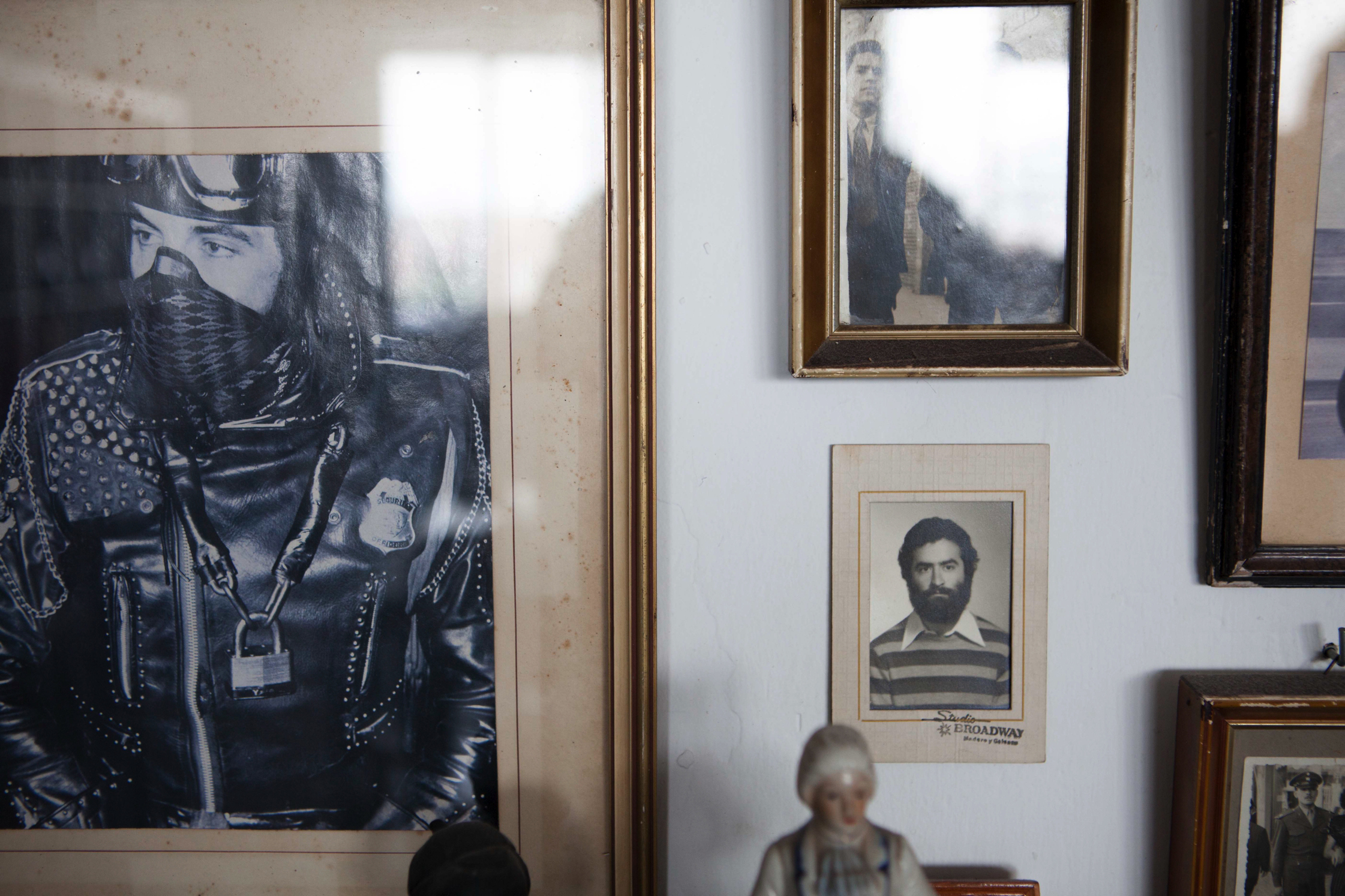
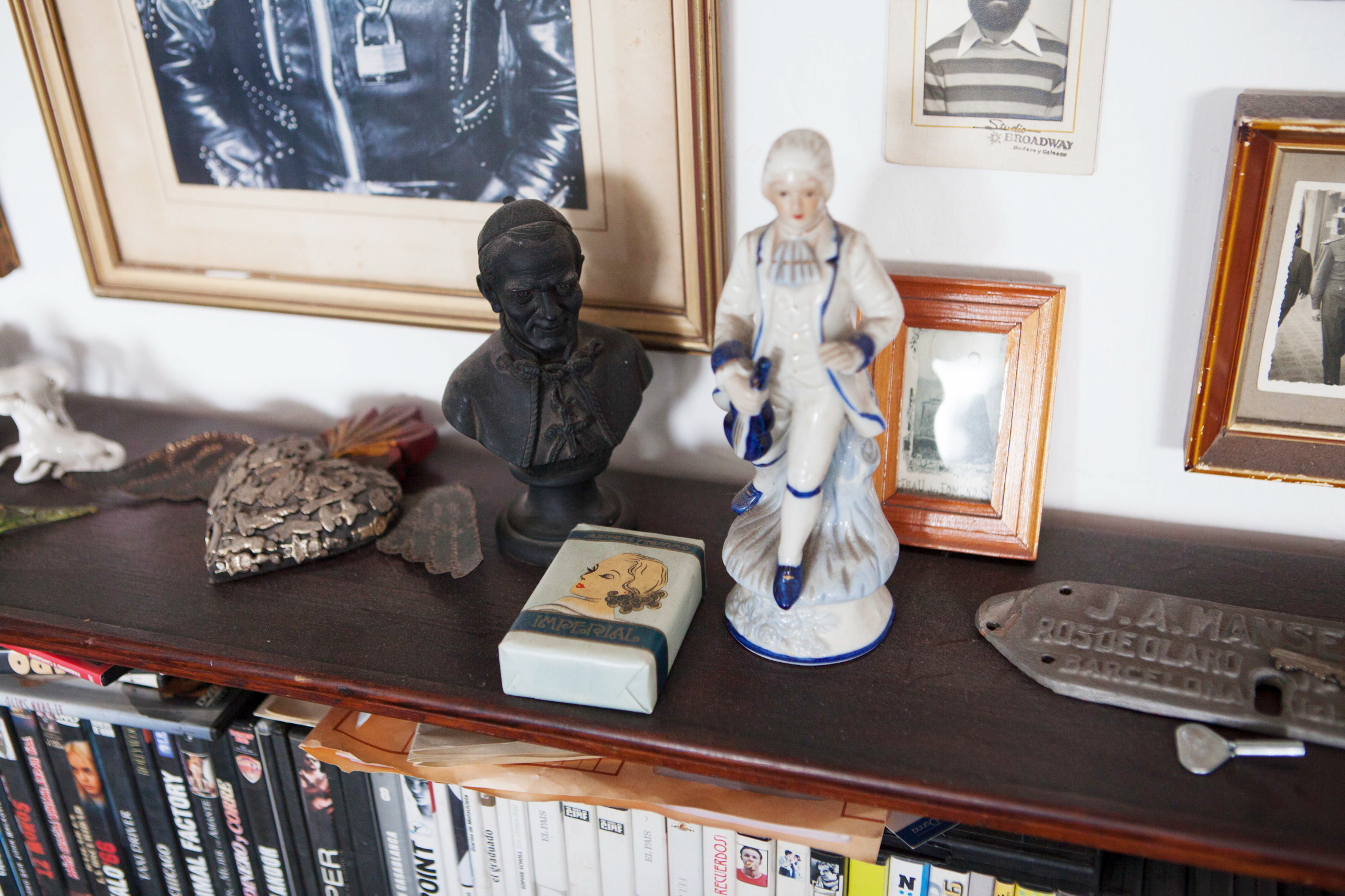
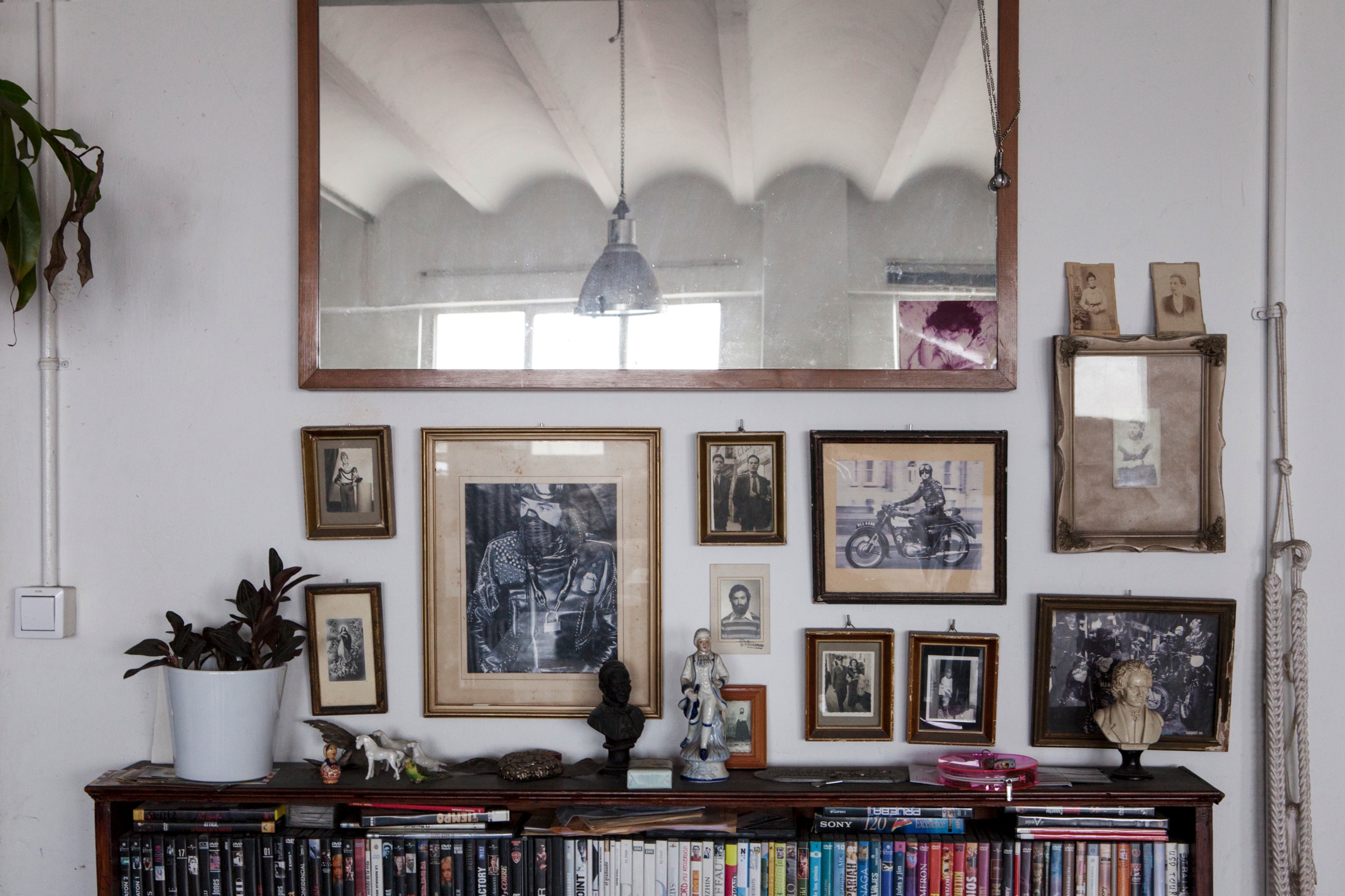
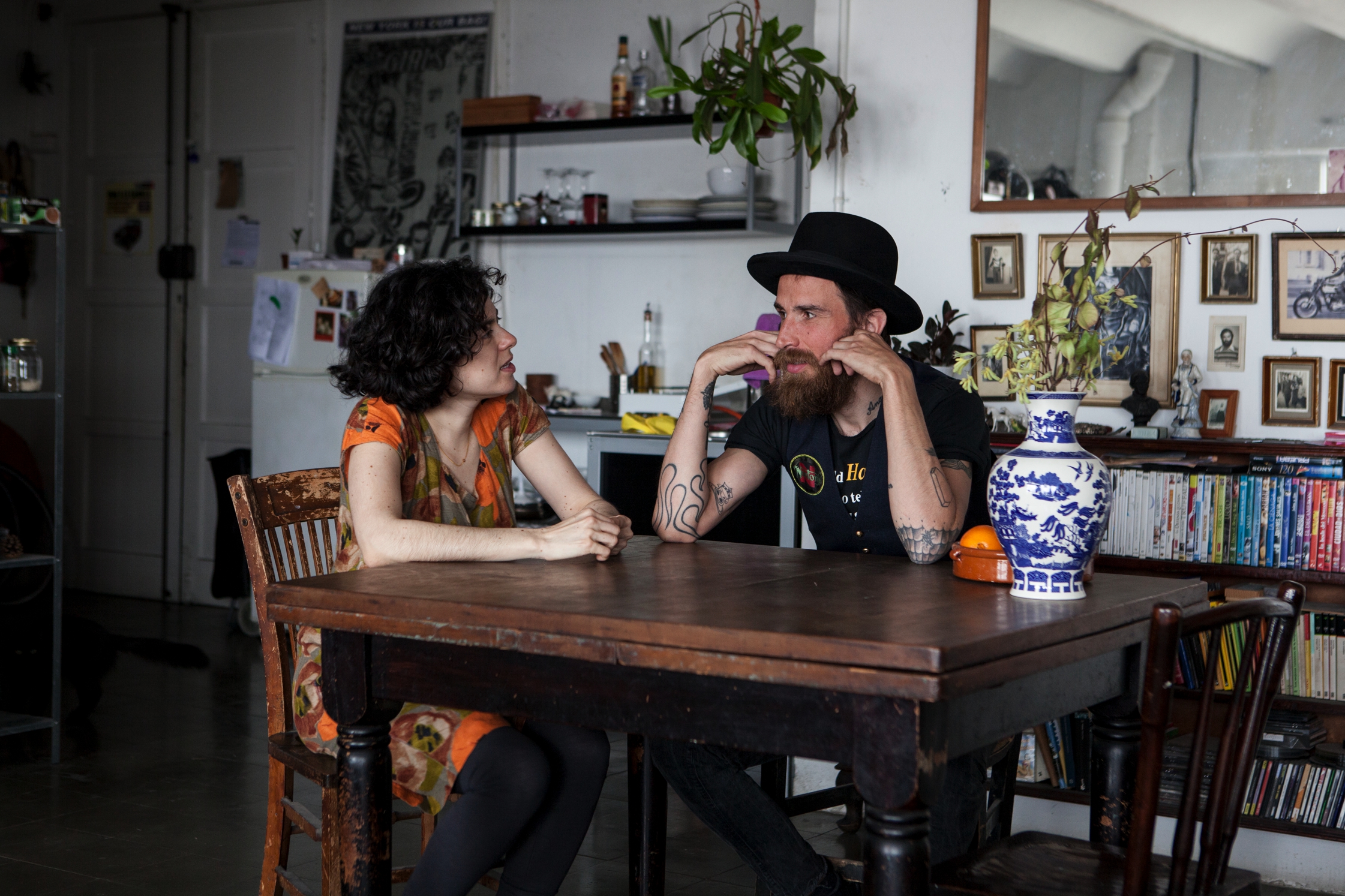
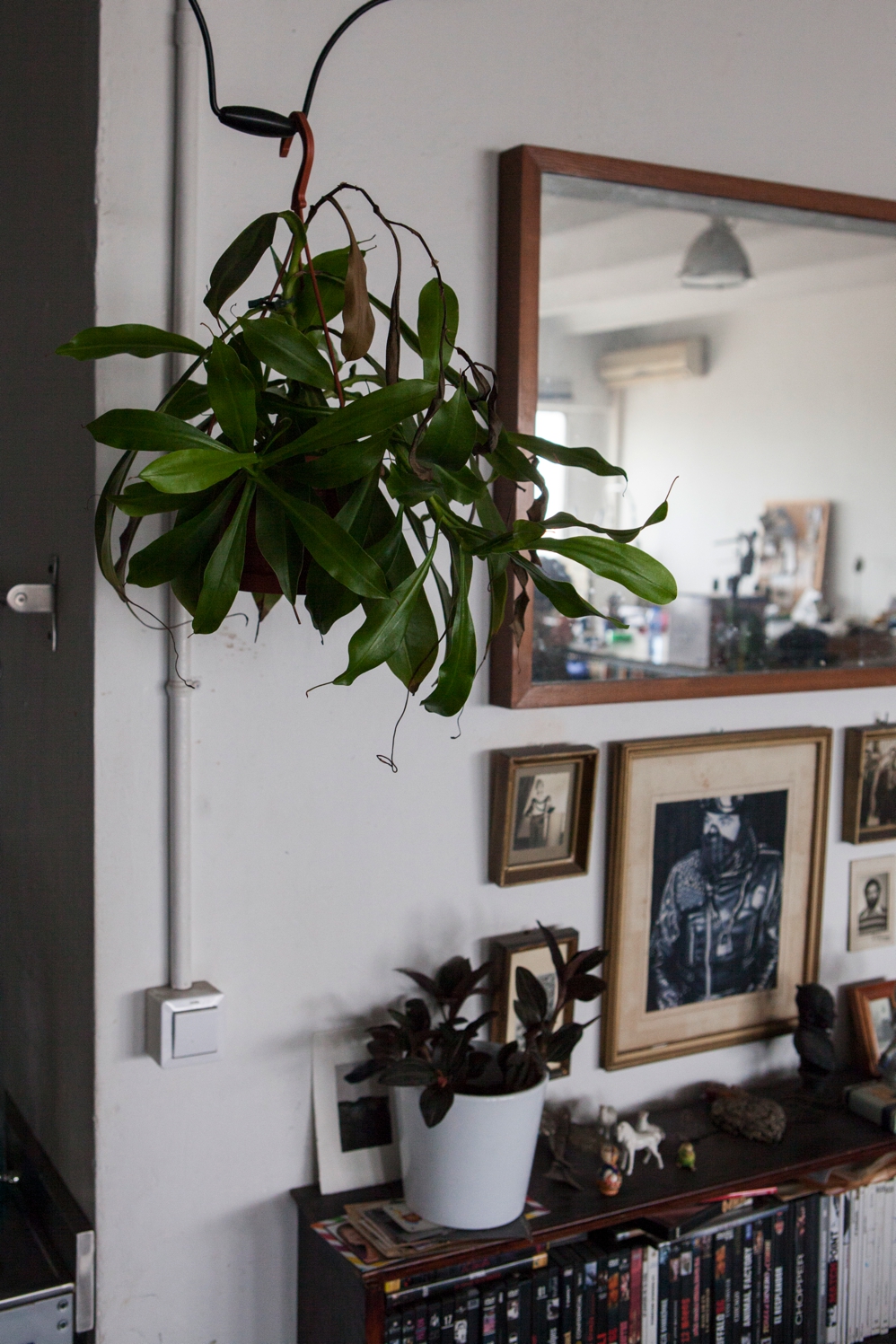
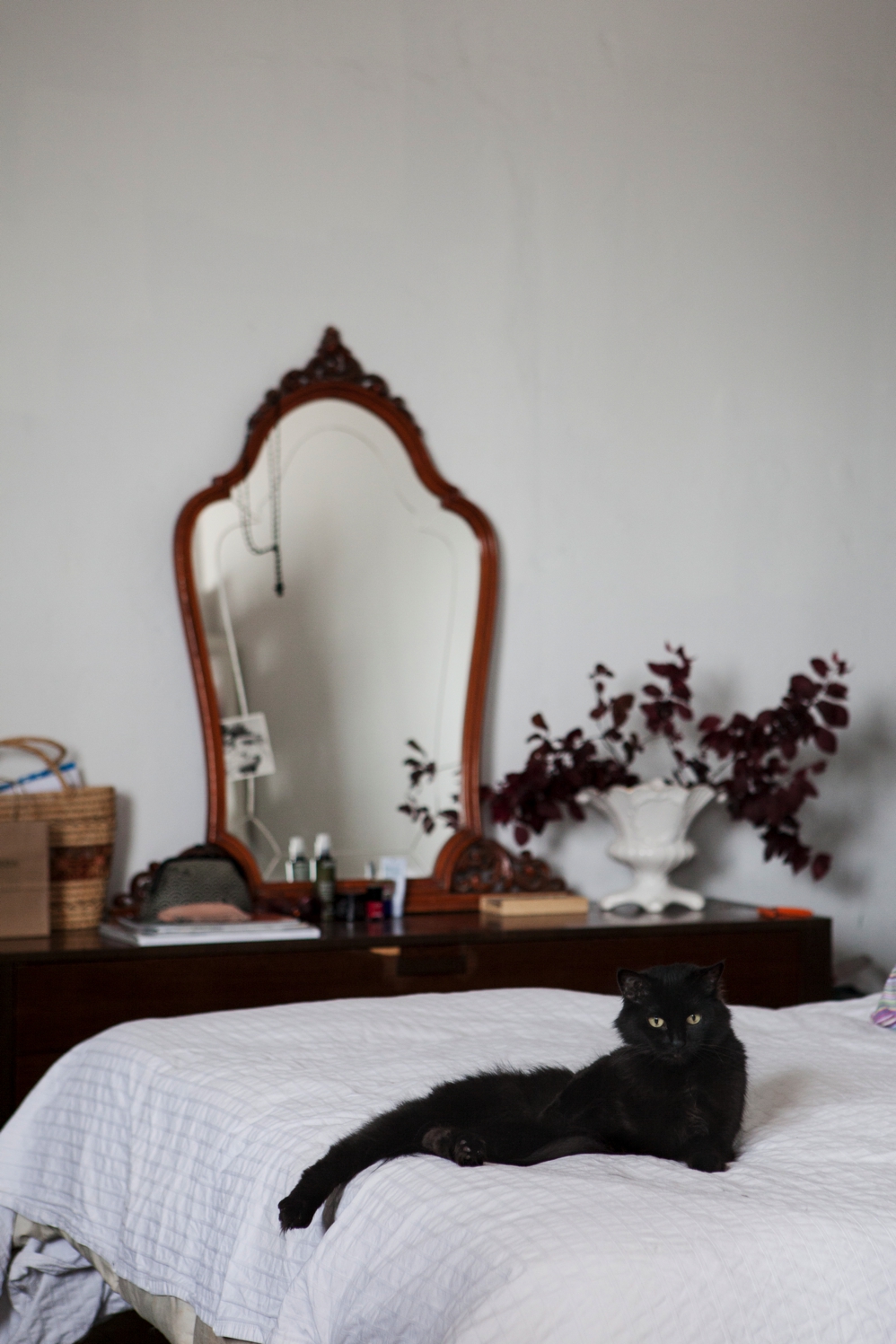
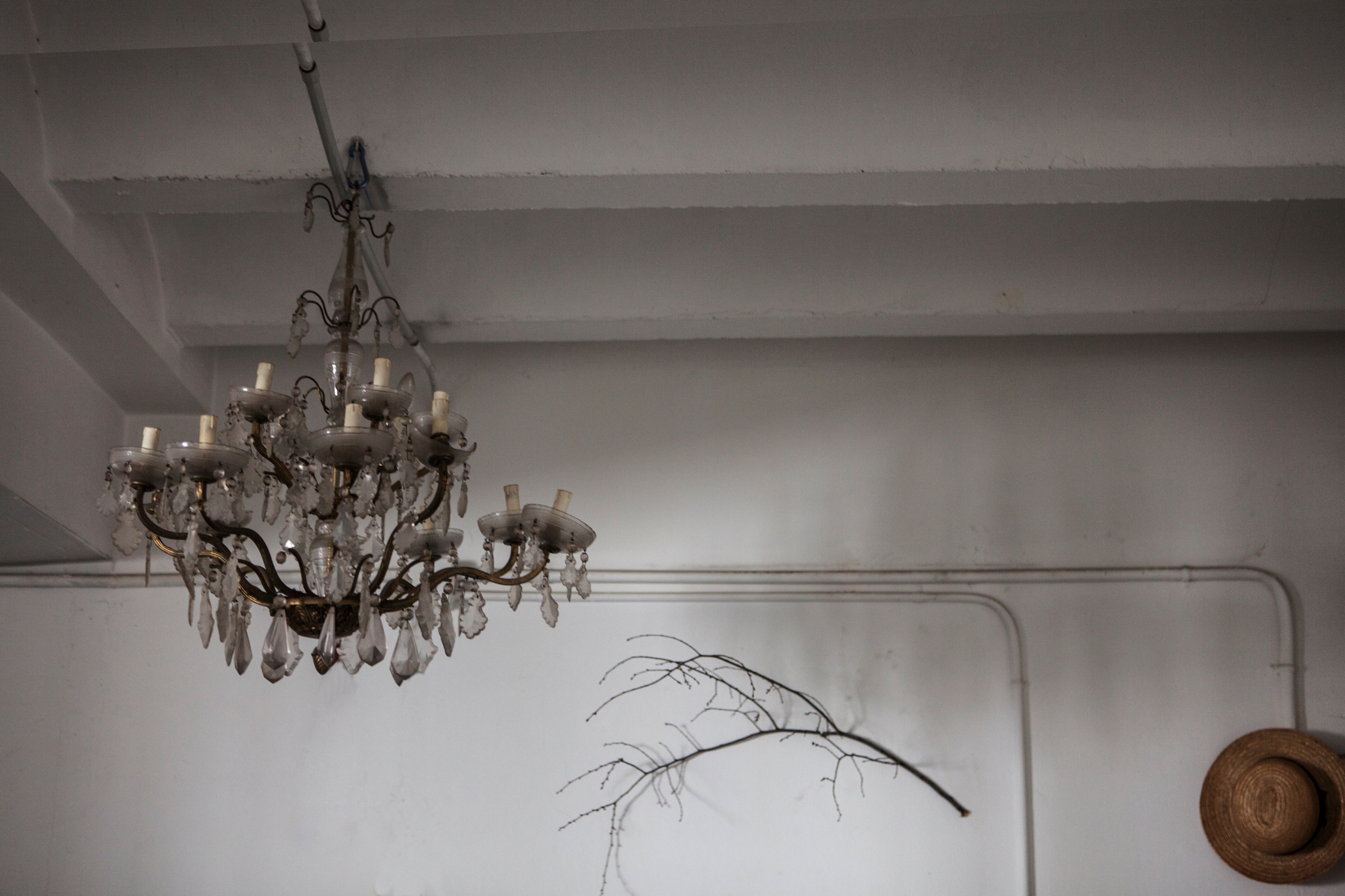
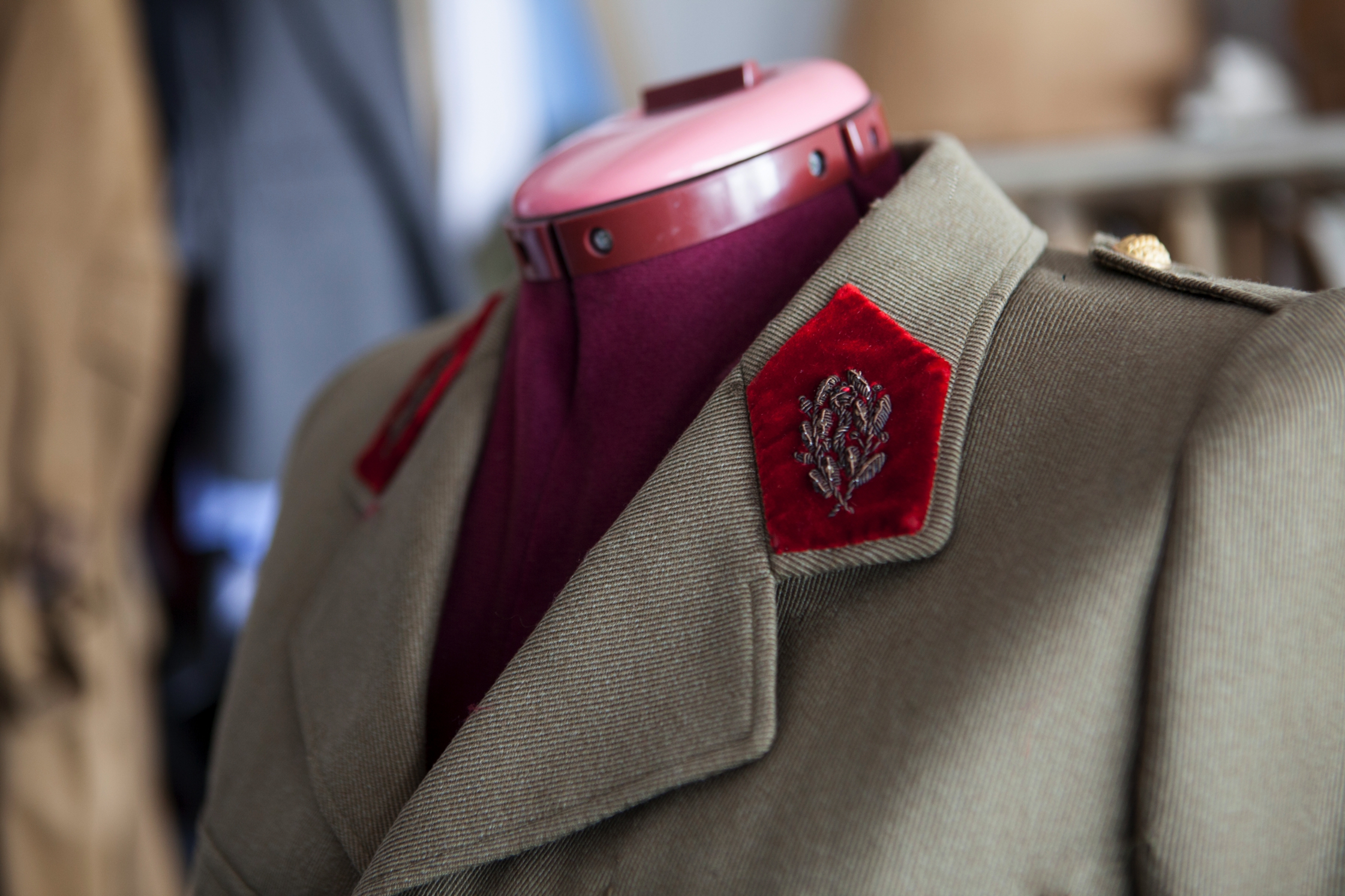
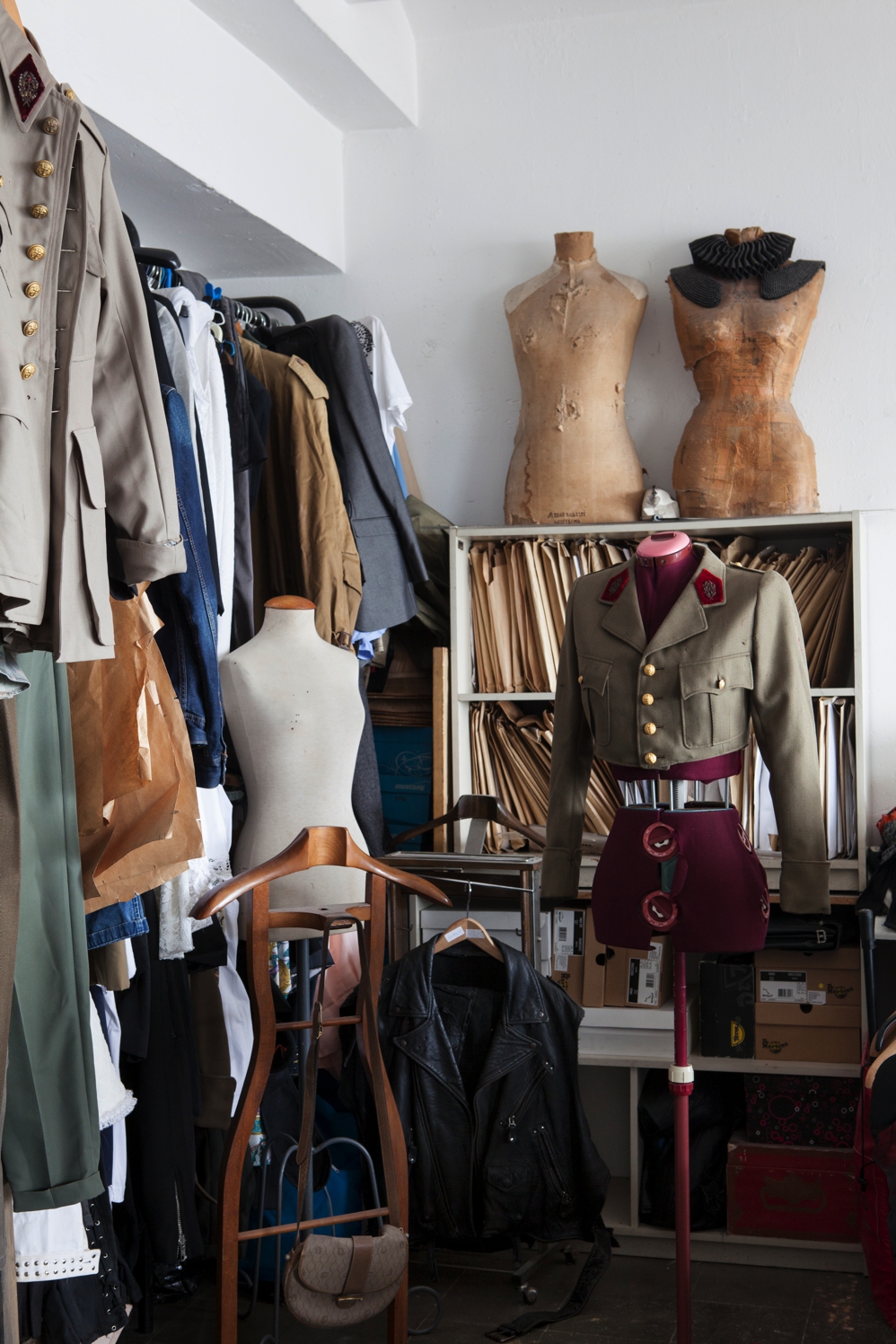
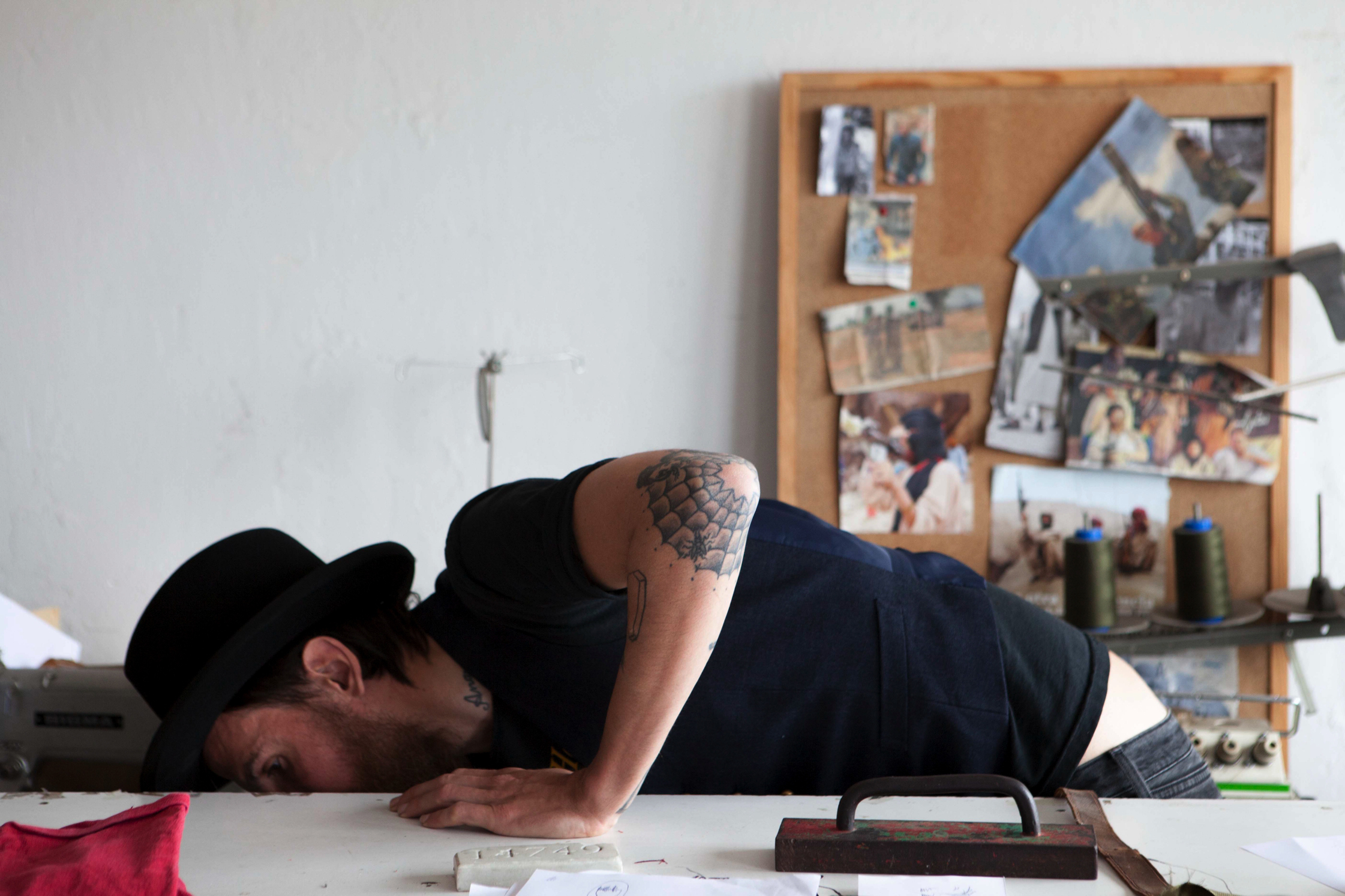
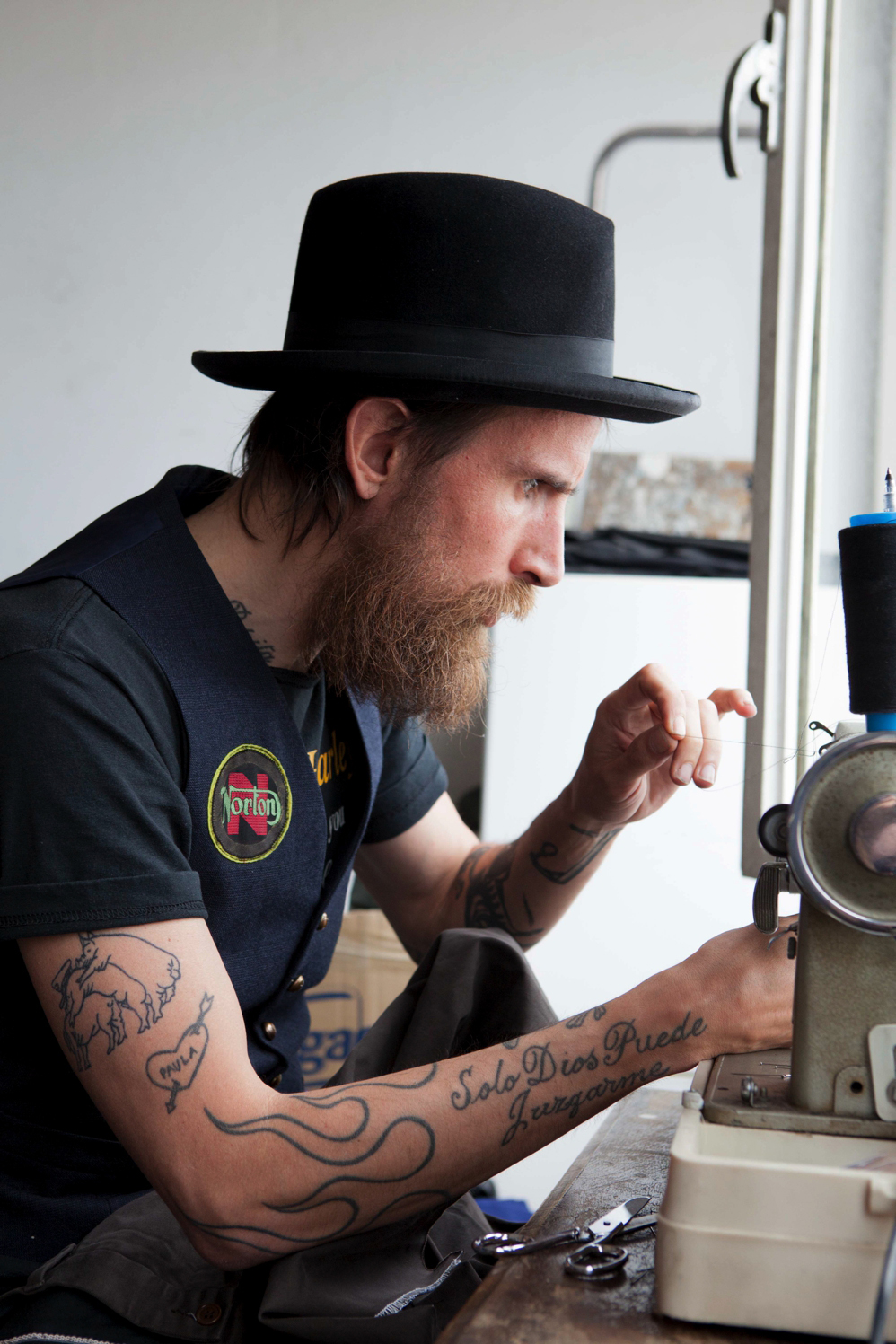
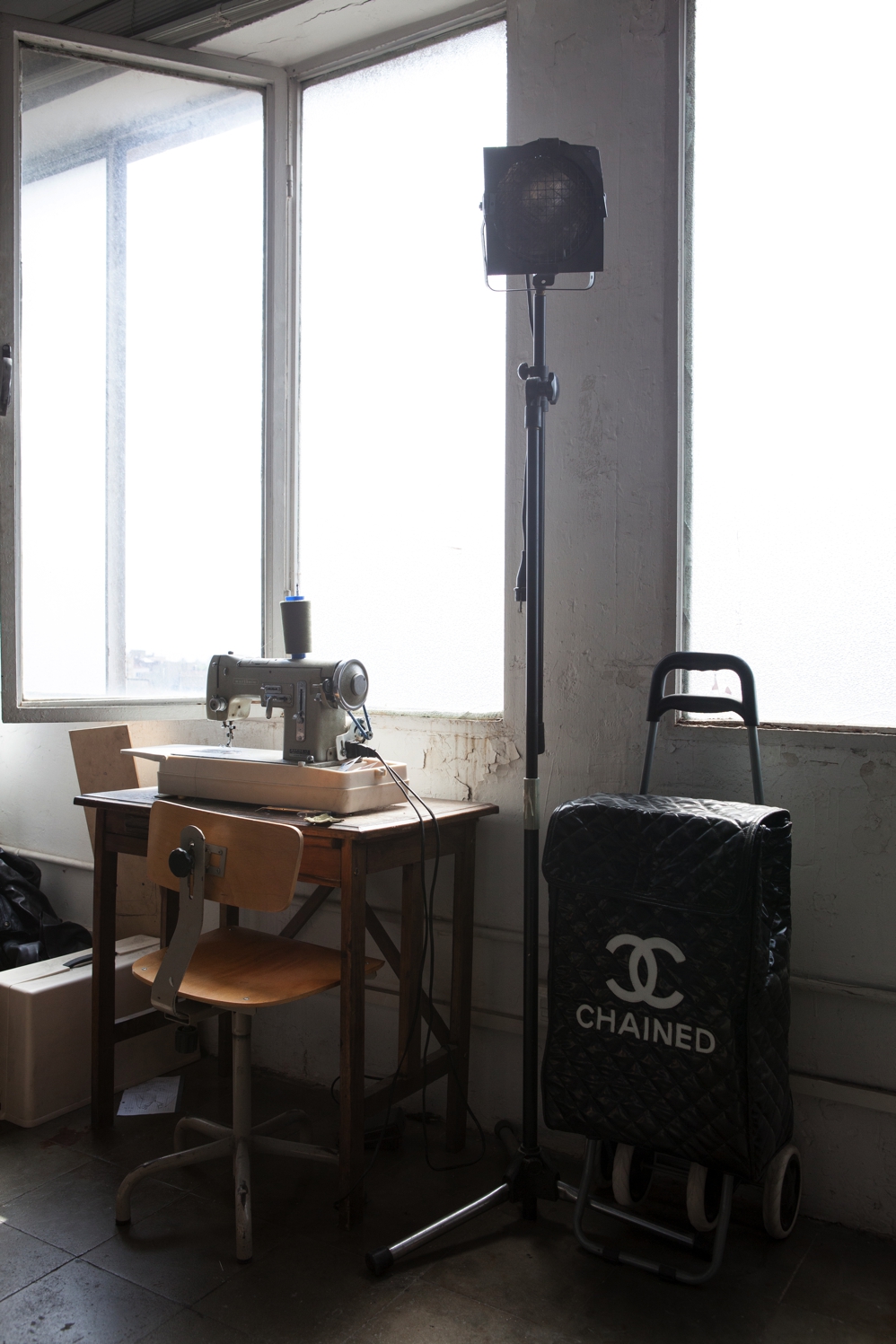
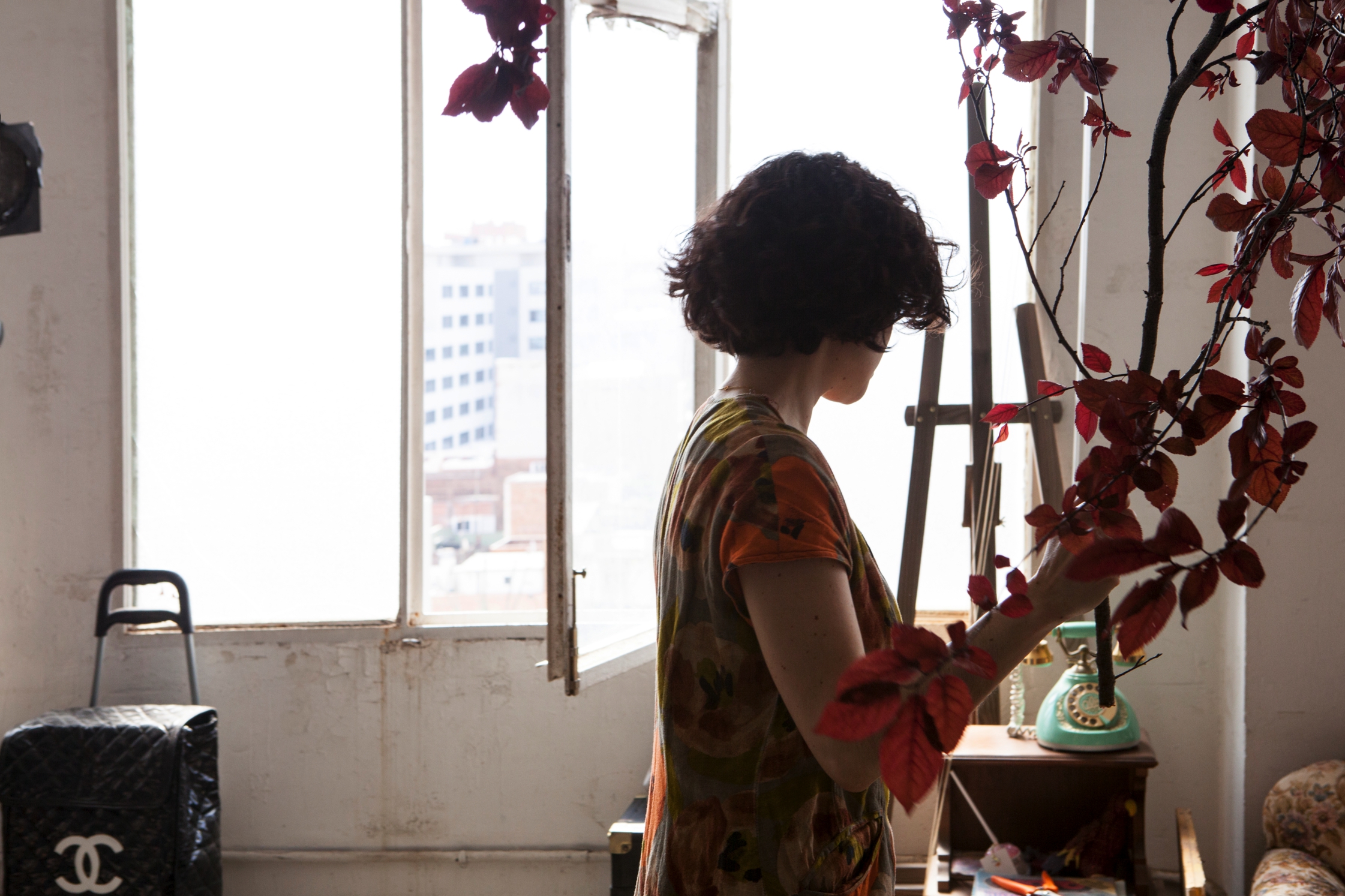
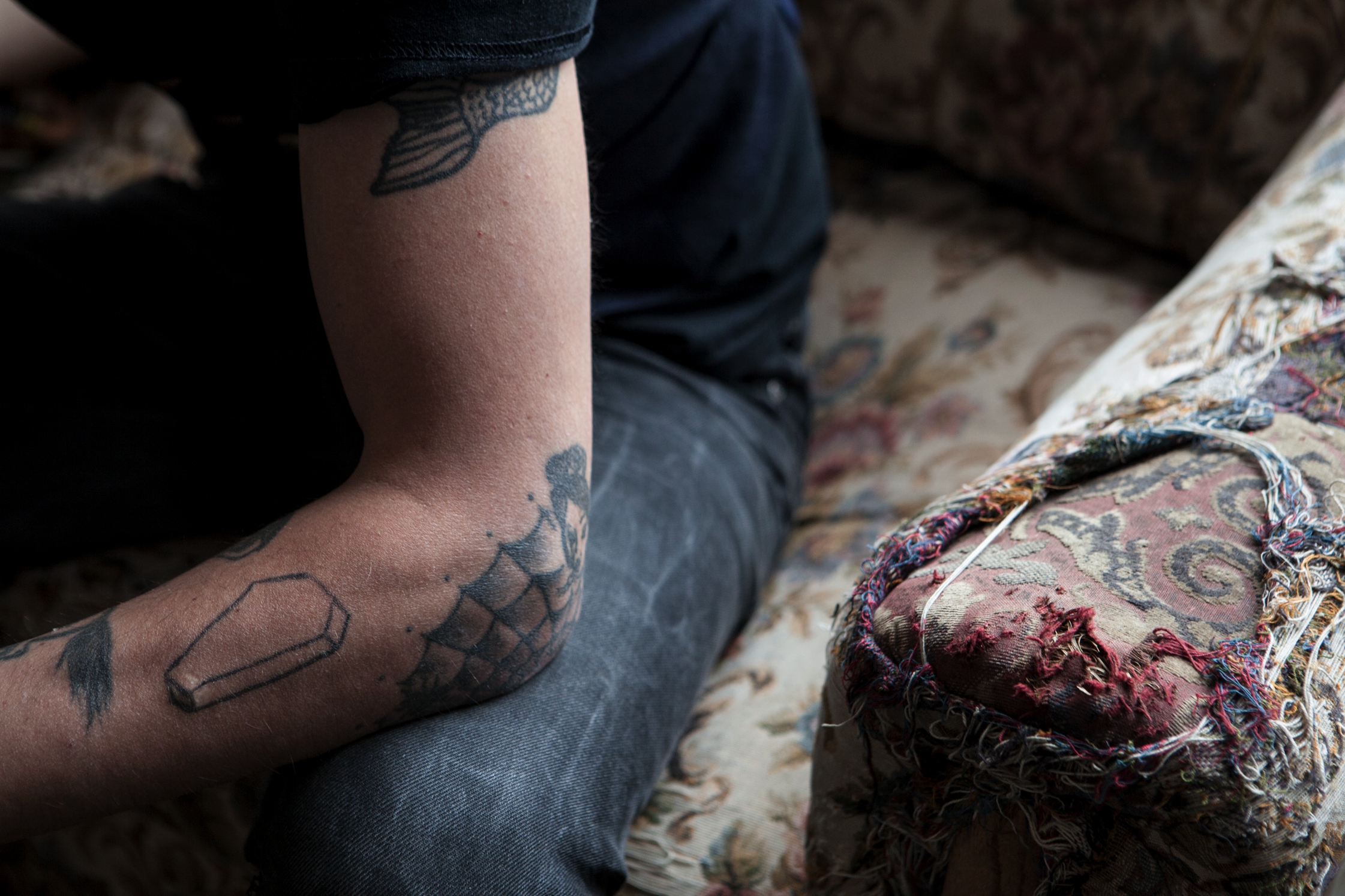
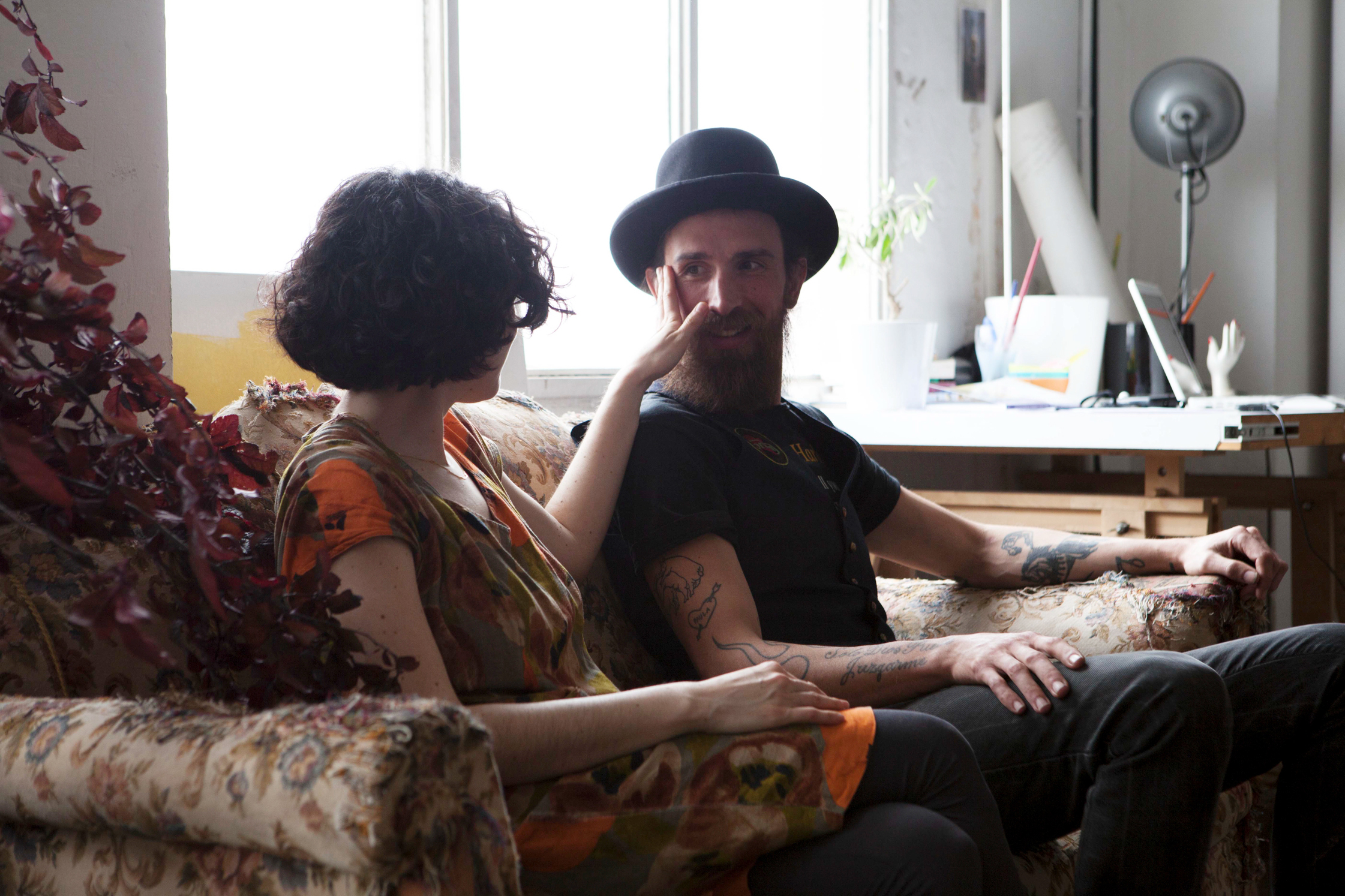
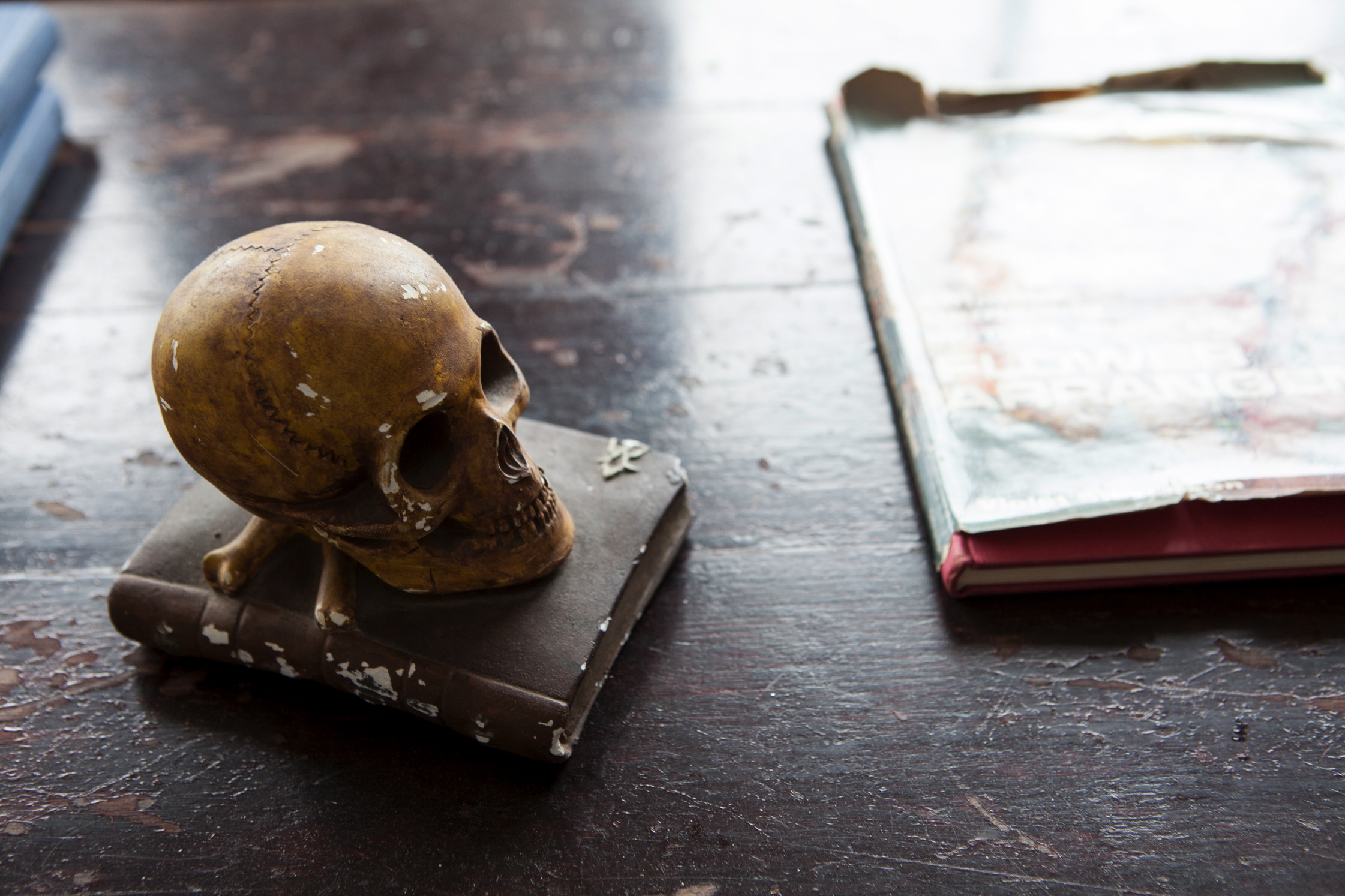
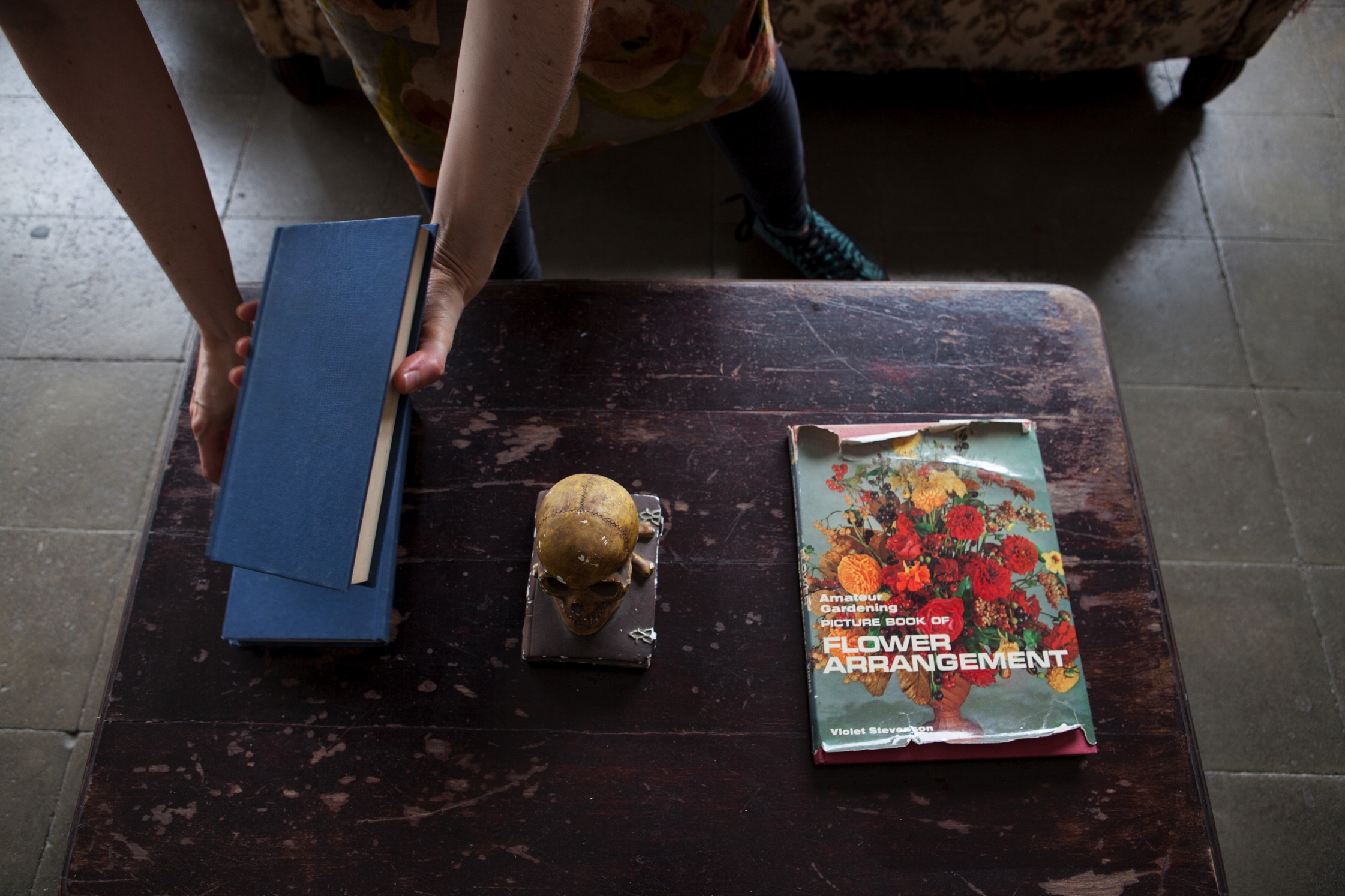
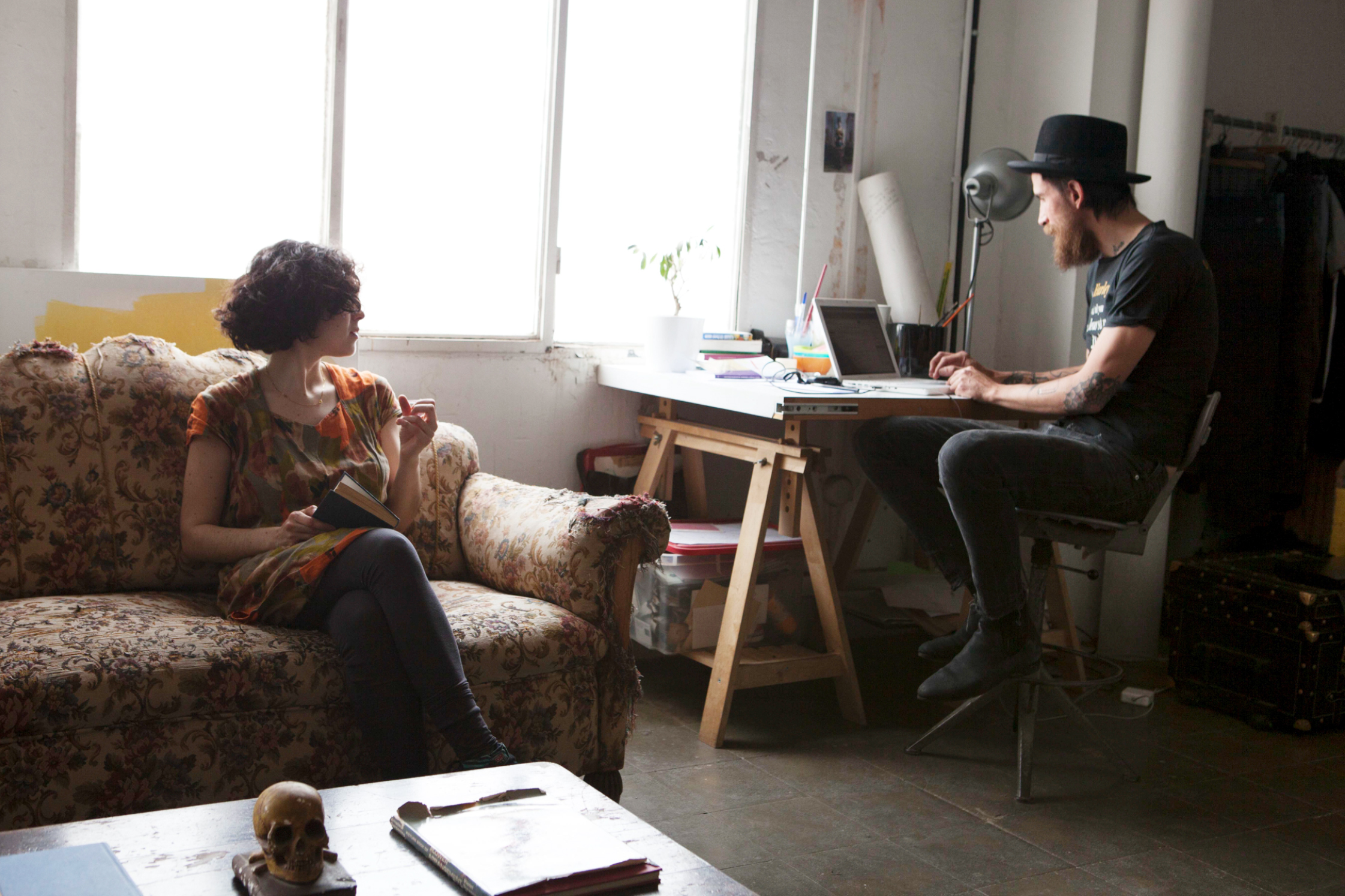
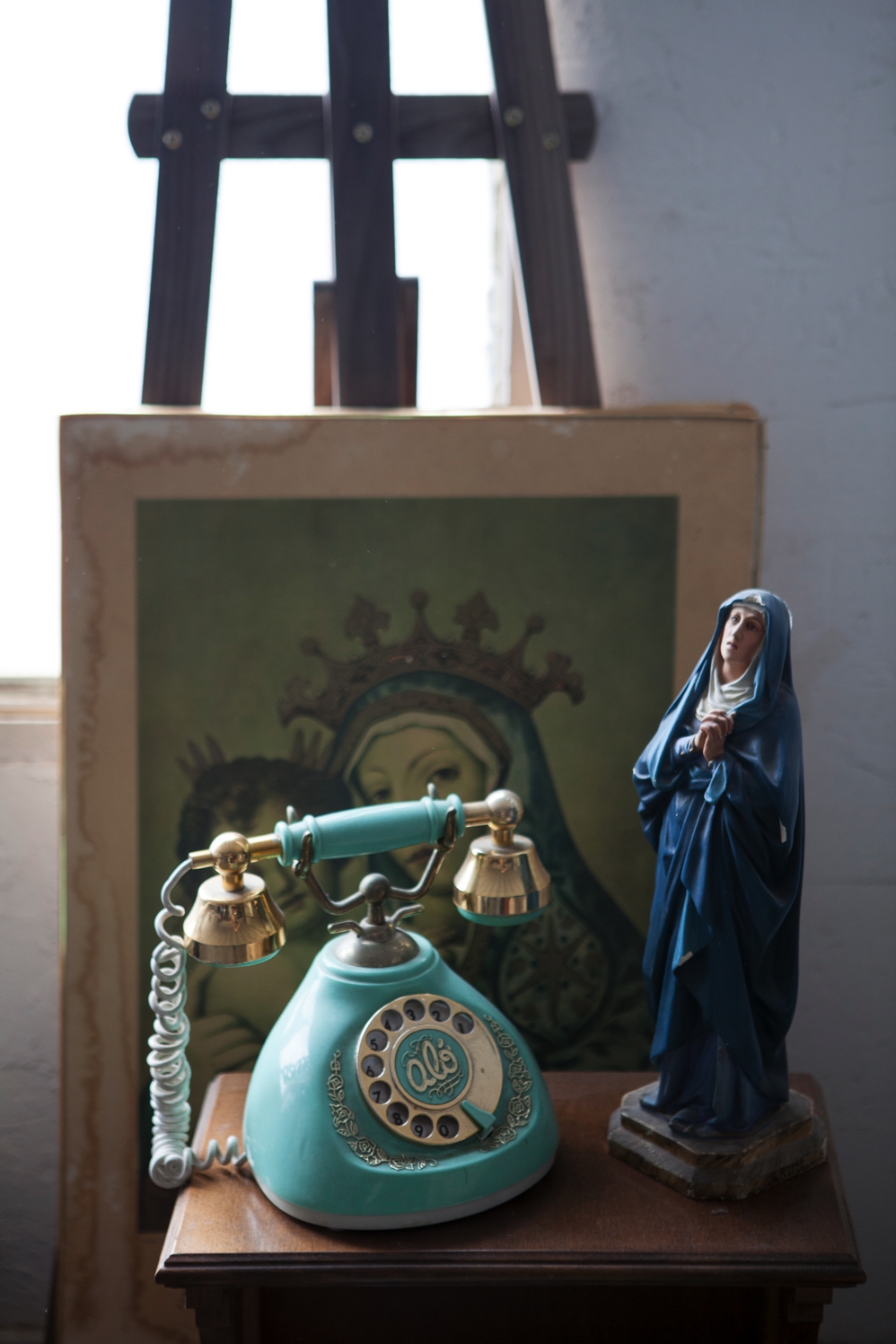
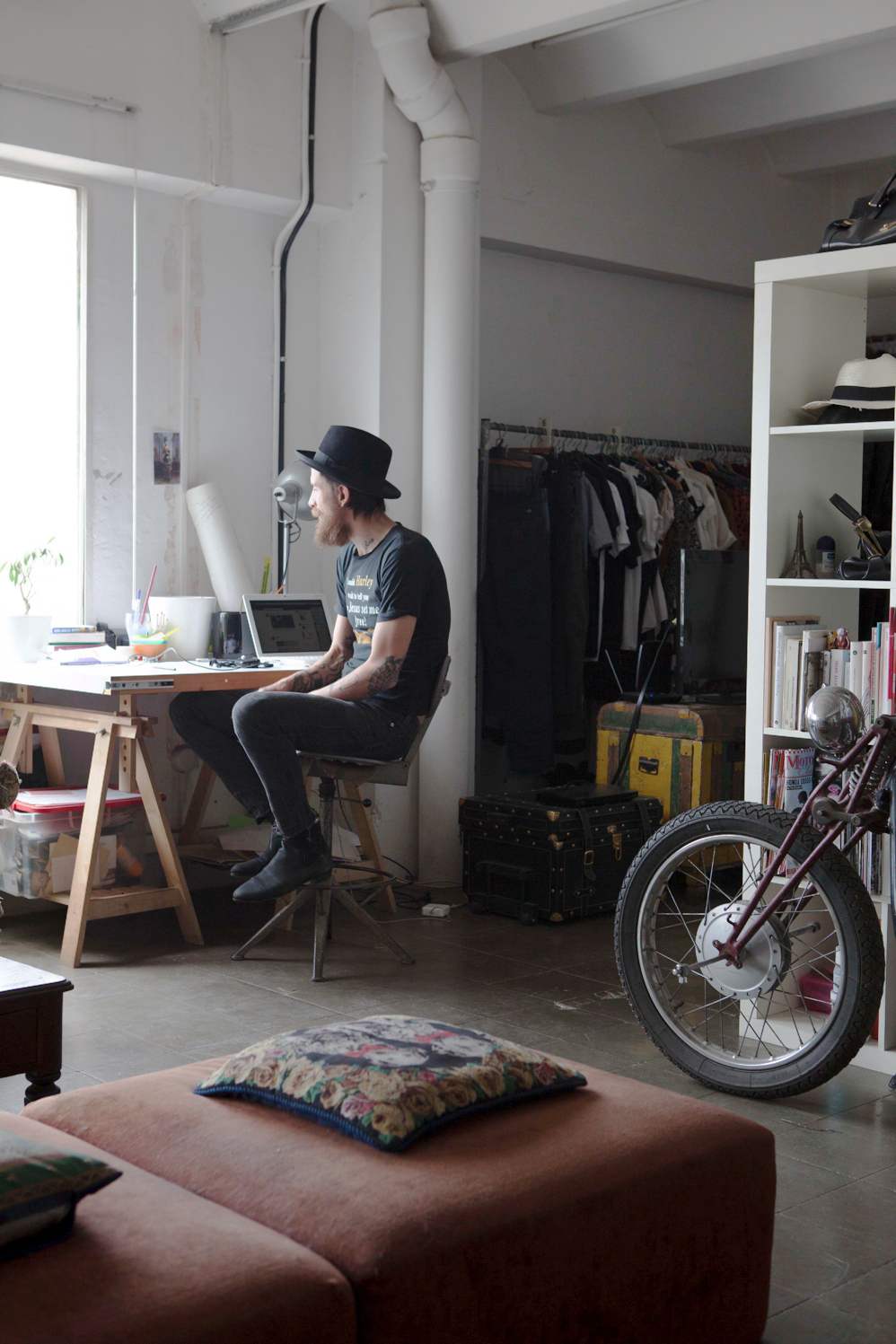
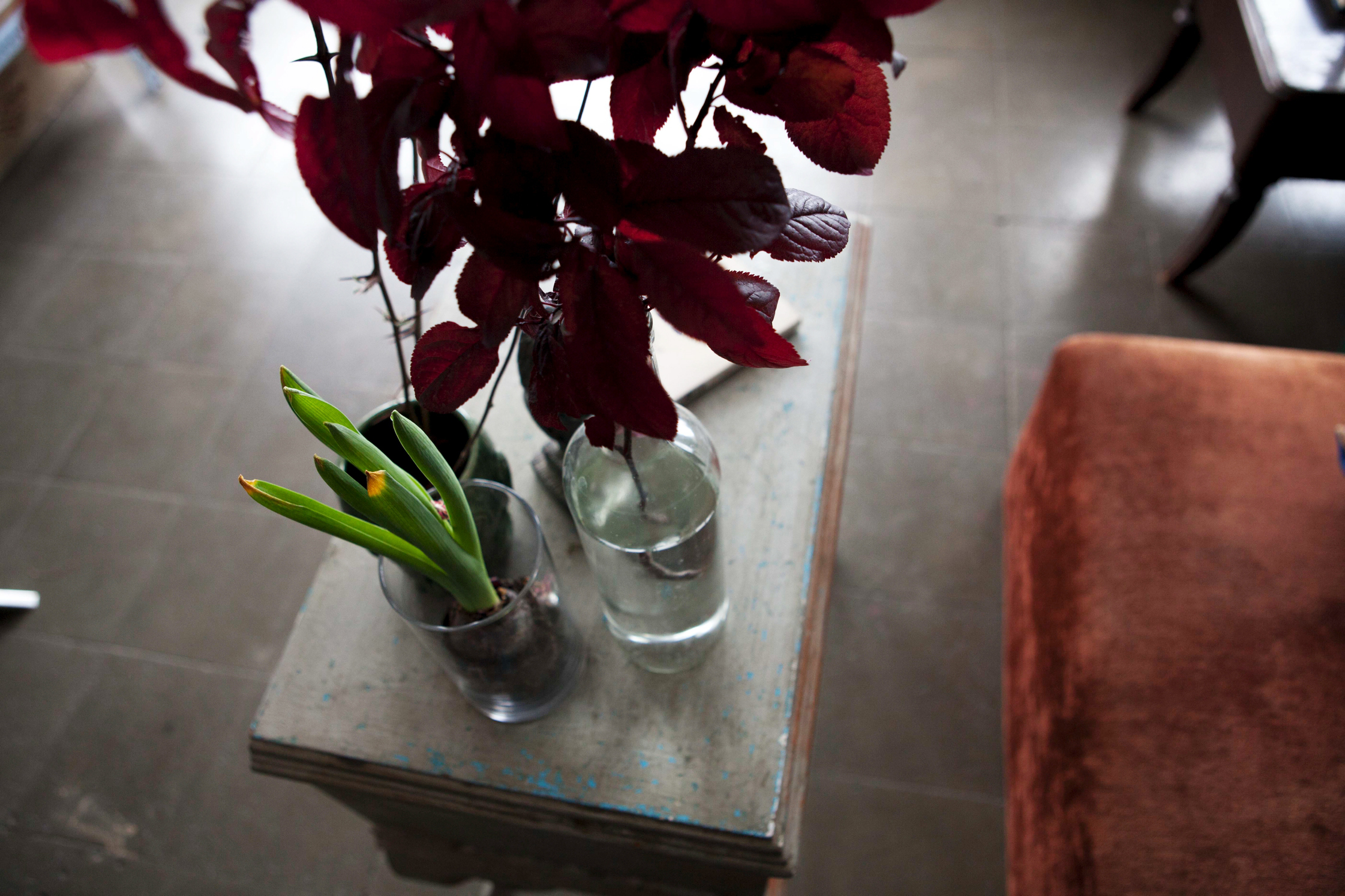
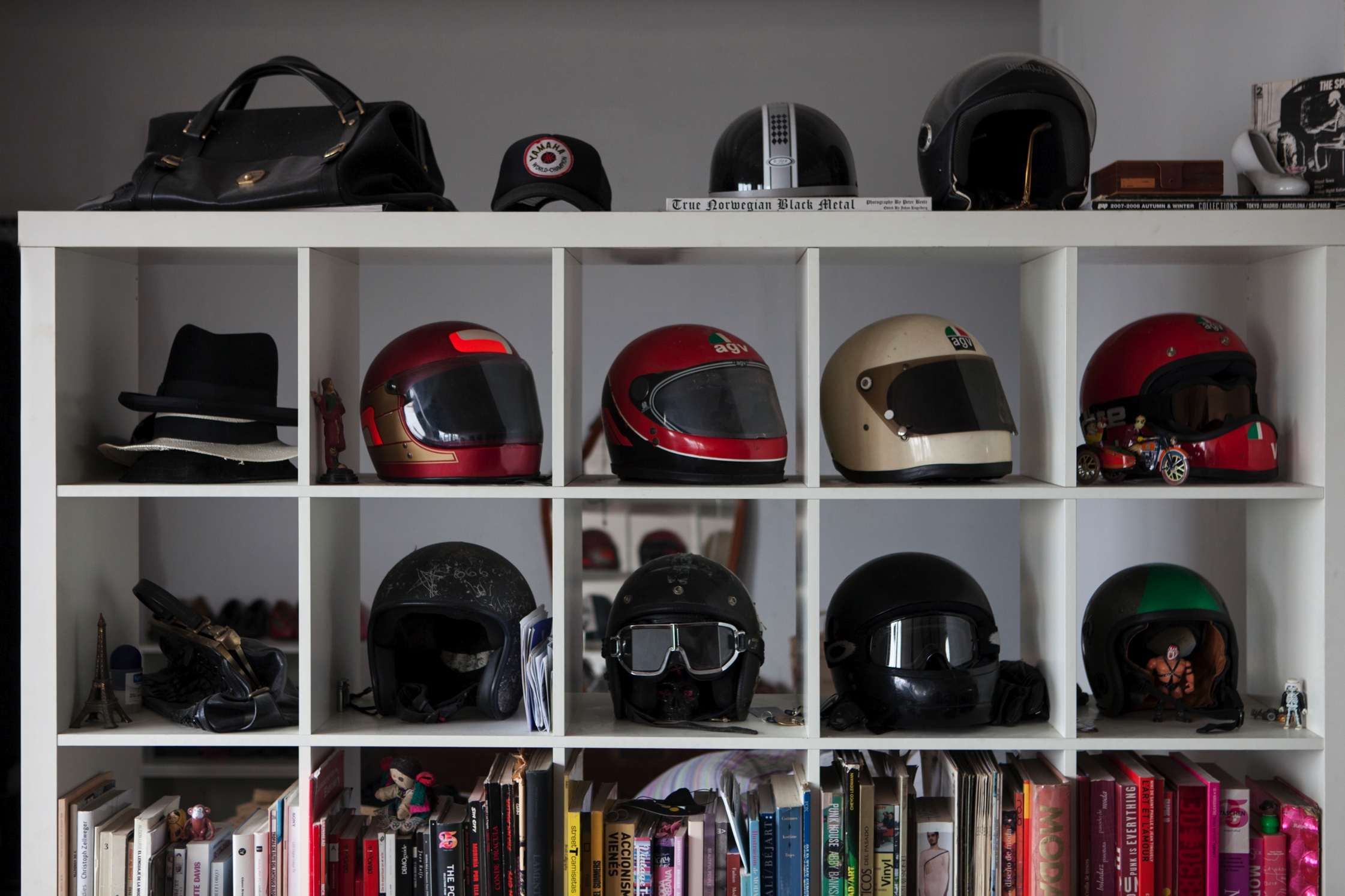
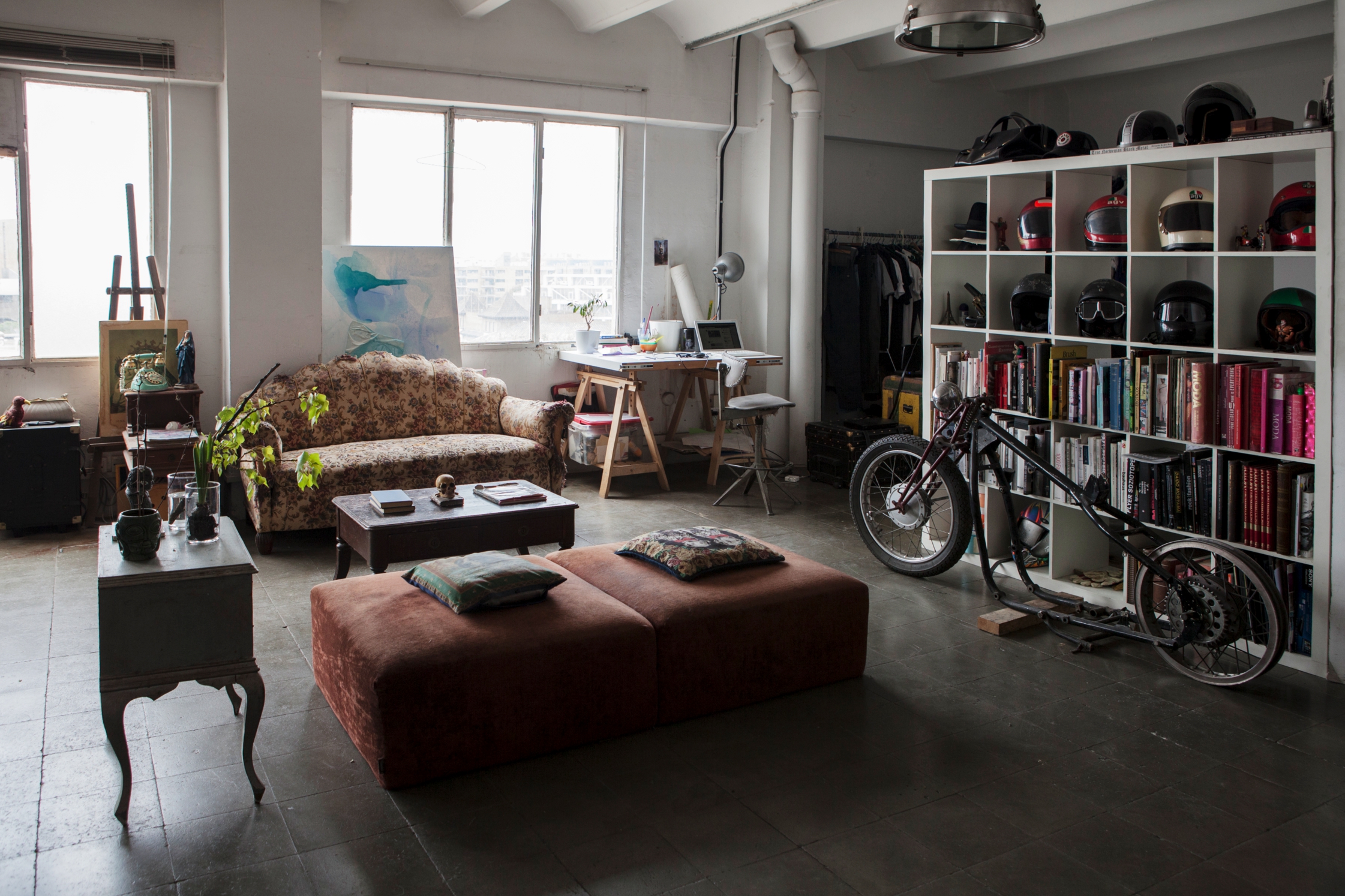
What are you both doing at the moment?
Laura: I arrived in Barcelona just over 11 years ago and I began studying fine arts during this time, but more recently I have moved beyond this. I am currently consumed with working with flowers.
Gori: I work as a fashion designer. I have a fashion brand and am currently committed to producing my own fashion lines as well as working with advertising.
Why did you decided to move to Barcelona?
Laura: I actually moved to Barcelona because my mother lived here, and additionally I wasn’t very happy living in Mexico.
How were you introduced to the world of fashion?
Gori: I was living in Mallorca and working in a boat restoration workshop. I became bored with it as I wasn’t creating anything special, so I came to Barcelona in search of something else. I’ve always had an interest in clothing, particularly tailored suits. I signed up for design school because I wanted to learn, and step by step I started to get the hang of it without really being aware of it. When I finished school I was asked to prepare a runway show and thus my journey into the fashion world began without much planning.
Laura, how did you begin working with flowers?
Laura: It was quite accidental as I had been out of work for about a year at the time and a florist friend of mine needed help so she gave me the opportunity to learn about it. I really enjoyed working with flowers so I started some studies in floristry and finally ended up in the world of floral arrangements.
My work with flowers came by chance even though my father is a biologist and as a child I spent a good deal of time with him in the field. My mother’s partner was also a botanist. Flowers have always compelled me in aesthetic terms but it really has been by chance that I started working as a florist. I think it is a beautiful way of earning a living. Flowers are also quite grateful, it’s difficult to make an ugly flower arrangement; you put a flower in a glass or in a coffee cup and that’s it. At that point if you are interested in taking it further you have to manage some technical aspects like cutting flowers for longevity, like a bouquet. This was the reason I started studying in the school for Floral Art in Catalunya. However, it is also easy to be self-taught since it’s so creative.
I like most flowers but I have a particular weakness for peonies and aldo wild flowers which are conducive to a more natural type of floral art. Also, who doesn’t like to receive flowers?
How long have you lived here? Why did you decide to move to Poblenou?
Laura: How long? About three and a half years. As for the why, we were looking for a large and luminous space. We needed a place where Gori could have a studio with good working conditions so that he could work from home. The prices are more reasonable in Poblenou and it offered the possibility of having an industrial warehouse near the beach, which was very appealing.
Gori: We were looking for a space like this in Poblenou for some time. It’s a former industrial district and this affects the architecture and the spaces. For instance, the ceiling in the offices can be quite tight. Finally we found this one and it was more untouched, more original, with floors as pretty as the ceilings, and with an abundance of light. When we saw it we thought, “This is our new home.”
How long did it take you to transform this industrial space into the home you currently live in?
Laura: Long enough! We were living here for a long time with the bare essentials, a fork, a knife and a spoon (laughs). We didn’t have anything. This house is like patchwork, we have been finding things for the house on the streets.
Gori: It’s been a process, with time and without any planning. First we bought a table, then a chair and little by little the house began to get the feel it has now.
You have tons of antique furniture, do you usually buy things from Encants, the local flea market?
Laura: Most of the furniture is Gregorio’s from his old flat. In truth, I didn’t have anything. But it’s true, most everything came from Encants.
Gori: Eighty percent Encants, twenty percent Ikea.
You have lived here for such a long time, bearing in mind the evident changes in a city like Barcelona in the past years, do you have a different image of the city compared to when you just arrived?
Gori: When I first arrived I didn’t have much of an idea about Barcelona. I first came to the city with my grandparents who are from here. I had come as a child and didn’t have an image of Barcelona like that of a capital or a city. With time I have gotten closer to Barcelona, realizing it’s not just any city. It is a little of everything. It lets you have certain hobbies that you can’t have in other places. Whatever your interests are it’s a city where you can pursue them.
Laura: To start with, I thought Barcelona was hot all of the time, that it was always summer. I actually came during the winter and I nearly froze. I didn’t know anyone here, so it was tough for the first few months. Now I am very rooted here. I have my friends and I can’t imagine living far from the sea like I did in Monterrey which is landlocked.
Would you change neighborhoods?
Laura: I am very happy here but if I had to move I would chose anywhere below Diagonal, downtown.
Gori: I would change neighborhood. I’d like to live in a town 10-15 kilometres from Barcelona. In the future I imagine living in a house with land, a garage, a garden, a barbecue and pool.
Laura: I could do without the pool but I do want a garden. In Mexico everyone’s house has a garden. It’s easier because it’s a different style of life. I would like to change to a more rural life, although I wouldn’t settle in a small town, but, I could at least try it out at some point.
The fact that you are a florist probably influences the fact that you want a garden.
Laura: Yes, maybe. Before it wasn’t important but once I began working in this field I noticed that flowers give everything another air even though it might not seem like it. I think that homes should be filled with plants, vegetation, leaves, stems and twigs.
Gori, in your case, besides fashion, when did you begin pursuing your passion for motorcycles?
Gori: In Mallorca I had a workshop where I restored motorcycles and antique cars. In fact, when I came to Barcelona, I closed the workshop and forgot about it for a long time. Also, you need a lot of space to carry out this type of work which is difficult in Barcelona. A few years ago I came back to it, specifically to motorcycles because they take up less space.
Laura: I would like to paint again. If we move to a town, I’d like to dedicate myself to it because I’ve put that on hold. I wouldn’t abandon the flowers though: I’d like to do both. Also living in the countryside offers less distractions than the city.
What do you think about the fashion industry in Barcelona?
Gori: In truth I don’t really follow the fashion world in Barcelona with much interest. I prefer to look and find designers outside, in Europe or in America, or discover young 19 year olds who are just starting with amazing talent. In Barcelona I still haven’t found anybody that interests me too much. I couldn’t give an honest opinion of fashion in Barcelona because I hardly know it.
What is it like to work and live in the same space?
Laura: It can be complicated. You lose intimacy. In our case, our home is Gregorio’s studio and for me there are times where it has been a little bit difficult and certainly a hot topic for debate. In the beginning, one can get excited in combining domestic and professional spaces, but it can become a problem. I think that when you live with your partner, its complicated to mix your home with your work. Also, I don’t gather as many things as he does. On the contrary: the less the better. Gregorio is a “junkman.” I get overwhelmed although I can see the charm in the things he he brings in. I don’t need much, just plants.
In your case, Gori, why do you accumulate so many things?
Gori: It’s not accumulation, they are old things, you see them and you have to have them. Then you don’t want to throw them away so you put them in boxes. I throw more things away than I care to. Nowadays, since I have the garage, we have half of the things we once did.
How did you organize the house?
Laura: There was once a wall separating the space which limited the general lighting. It would have been nice to have a separate room but we wanted to have an open space that allowed light to come through so we tore it down.
Gori: That room was originally meant for storage. We left one room to divide the bedroom.
Laura: The truth is that we shouldn’t be living here – the space is not zoned for residential living – which has caused issues with the owners. But we are good, responsible tenants. We never throw parties.
Gori: We didn’t really say we were going to live here. From the first moment, when we saw the space we knew the building was full of studios, offices and workshops. Since I had my clothing line, it fit in as a studio. We originally rented it as a design studio. With time they realized we were living here. You build a kitchen, you keep making changes.
So you have domesticated the space.
Laura: Originally the space had a shower. We built the kitchen which is still a “camping” kitchen. We’ve said, little by little, we were going to be buying things for the kitchen, but we never did. There comes a time when you want to live with some comforts because we are not 20 anymore. The truth is I do miss a bathroom “like god intended” . The problem is that our contract will expire soon and we will have to find a new place, but we want to stay in Poblenou. Because of our problems with owners its unlikely they will renew the contract.
Gori: We’re already looking at other spaces in the area but its really expensive to fix up a new flat. Maybe its not convenient to spend all the money in a house that isn’t yours either.
Laura: Also, there are owners that will allow you to live in these types of spaces. Actually, the idea now is that if we move we will tell them that we will live and work in the space. I don’t want to have any more problems because it’s rather uncomfortable.
Gori: Infact, most people that we know live in this sort of space and rarely have problems with the landlords because they assume that for the past decade Poblenou is an underground neighborhood. In reality, it’s nothing new.
Poblenou is an industrial district which does not have many stores or bars like other zones in the city, how do you go about everyday life?
Laura: In our case we have it easy because we live right on the limit. We have a mall or La Rambla de Poble Nou nearby; a 15 minute walk. I like to go in the morning and shop and walk around. At night it’s quite still.
Gori: Maybe it’s inconvenient because of that, but on the other hand you have so much tranquility. Everything empties out by 6pm and during the day it isn’t too bustling.
Laura: I make my day in la Rambla de Poblenou which is very lively with bars and shops. It’s true that there are more offices than bars even though there is one across the street we have breakfast in. We also go to “Chiringuitos” on the beach, because although some are very expensive, some are also very good.
Gori: I think that you grow accustomed to what you have nearby. You end up going to the local bar or to the neighborhood cinema. The same thing you do downtown you can do here during the week. For instance, you have the Nau, where you can have a drink in the evening, but it’s true, we do go downtown on the weekend.
Would you say the area has changed with growing development?
Laura: It looks like the history of the neighborhood is vanishing. It used to be a working, industrial neighborhood and I feel it’s losing that charm. They could reuse this past; the spaces fit the current needs, for people that are looking to work in the same space where they reside. I think they should respect the proper history of the space instead of erasing it and reconstructing it into something else. It takes away all of the historic depth that these spaces and the neighborhood as a whole have; which is its charm. Here in Barcelona they think differently: wipe the slate clean. Here modernity and newness are valued more than restoring the past. Eventually, they are going to make this area into a more designer lifestyle feel which will be nothing more than cold and horrible.
Laura and Gori many thanks for the interview and telling us about your neighborhood in Poblenou. Learn more about Laura here and for Gori and his fashion company visit here.
Photos by Rubén Ortiz & Natalia Guarín
Text by Sonia Fernández Pan
[:es]
Laura González llegó hace años a Barcelona desde Monterrey, México. Tras terminar sus estudios en Bellas Artes, abandonó la pintura para, después de unos años y gracias a esas casualidades de la vida, dedicarse a la floristería y desarrollar su actual pasión por el mundo de los arreglos florales. Su compañero, Gregorio Fernández, también se mudó hace años a Barcelona desde Mallorca, donde trabajaba en un taller de restauración de motos y coches antiguos. Una vez en Barcelona y atraído por el campo de la sastrería, estudió moda, creando finalmente su propia marca de ropa como diseñador de moda, Gori de Palma.
Laura y Gregorio son pareja desde hace años y, como muchos otros en Barcelona, decidieron mudarse al barrio barcelonés de Poblenou para convertir un local industrial en un espacio capaz de combinar lo doméstico con lo profesional. A pesar de las dificultades de mezclar diariamente dos registros vitales en un mismo ambiente que funciona como vivienda y como taller de moda, Laura y Gregorio han conseguido crear un espacio singular y agradable en el que tienen cabida multitud de objetos, ya que entre las diversas aficiones de Gregorio está el coleccionar sin motivo objetos que se va encontrando a lo largo del tiempo. Muebles antiguos, bicicletas, arreglos florales, motos vintage, grandes cantidades de ropa en confección, multitud de objetos delicados y un precioso gato negro dan forma a un espacio que ambos han conseguido construir con paciencia a lo largo de casi cinco años de convivencia en una de las zonas con más encanto de Barcelona.
Laura: Yo estudié Bellas Artes. Llegué a Barcelona hace 11 años y medio. Empecé estudiando pintura pero ahora he terminado y trabajo con flores.
Gori: Trabajo como diseñador de moda. Tengo una marca y actualmente me dedico a hacer producciones de mi propia marca de ropa y producciones de publicidad.
¿Por qué decidiste moverte a BCN?
Laura: En realidad vine aquí porque mi madre estaba viviendo aquí yo no estaba muy contenta en México. Tenia la oportunidad o, bien de moverme dentro de México, o venirme a Europa. Y, claro, me vine a Europa.
¿Cómo te introduciste en el mundo de la moda?
Gori: Estaba viviendo en Mallorca, trabajando en un taller de restauración. Me cansé, pues estaba un poco agobiado de sentir que no estaba haciendo nada especial y me fui a Barcelona. Siempre había tenido interés por la ropa, más concretamente por la sastrería y los trajes a medida. Me apunté en una escuela porque quería aprender y al final, poco a poco, le fui cogiendo el gusto hasta, sin darme cuenta, terminé la carrera y me invitaron a mi primera pasarela, empezando en el mundo de la moda sin ser algo muy planeado.
¿Cómo has terminado trabajando con flores?
Laura: En realidad fue casualidad porque estuve bastante tiempo sin trabajo, casi un año, y una buena amiga mía que es florista justo en ese momento necesitaba a alguien y me dio la oportunidad de empezar a trabajar con ella. Como me gustó, me puse a estudiar y, finalmente, he terminado en el mundo de la floristería.
Las flores son una casualidad, aunque debo decir que mi padre es biólogo y de pequeña pasaba mucho tiempo en el campo. La pareja de mi madre es botánica también. Estéticamente siempre me han llamado la atención, pero realmente fue por casualidad que llegué a trabajar como florista. Me parece una forma bonita de ganarte la vida. Además las flores son bastante agradecidas. Es difícil que un arreglo floral te quede feo; pones una sola flor en un vaso, en una taza de tu casa y ya está. Luego, si te interesa saber más, es importante saber algunas cuestiones técnicas sobre cómo cortar las flores para que duren más, cómo hacer un ramo… Este fue el motivo por el que yo me inscribí en la escuela de arte floral de Catalunya. No obstante, también es un trabajo bastante autodidacta, como casi todo lo creativo.
Me gustan casi todas las flores, pero tengo debilidad por las peonias y las flores silvestres y por un estilo más natural en floristería. Además, ¿a quién no le va a gustar que le regalen flores?
Desde hace cuánto tiempo que vivís aquí? ¿Por qué decidisteis mudaros al barrio del Poblenou?
Laura: ¿Cuánto tiempo? …casi 5 años o cuatro años y medio. Con respecto a la elección de barrio, buscábamos un sito con espacio, grande, con luz, pensando sobre todo en que Gori tuviese un taller con buenas condiciones, para que pudiese trabajar en casa. Además en Poble Nou los precios son más económicos y queríamos un espacio “nave” industrial. Además, está cerca de la playa y esta situación de proximidad era algo que me apetecía mucho.
Gori: Estuvimos buscando mucho tiempo un espacio con estas características en Poble Nou, pues ahora es una zona de oficinas y esto influye en los espacios, que se adaptan, por ejemplo con esos techos de oficinas… Finalmente encontramos éste y era como más “virgen”, más original, con el suelo tan bonito como sus techos, con mucha luz. Según lo vimos pensamos “esta es nuestra casa.”
¿Cuánto tiempo os llevó convertir un espacio más o menos industrial en la casa en la que vivís actualmente?
Laura: Un montón. Estuvimos viviendo mucho tiempo, como quien dice, con un cuchillo, un tendedor y una cuchara (risas). No teníamos nada! Es un poco patchwork esta casa, pues nos hemos ido encontrado también cosas por la calle.
Gori: Ha sido un proceso, a lo largo del tiempo y sin que fuese nada planeado. Primero compramos una mesa, luego una silla y, poco a poco, ha ido cogiendo el color que tiene ahora.
Tenéis un montón de muebles antiguos, soléis ir a comprar a Los Encantes, el mercadillo del barrio?
Laura: La mayoría de muebles son de Gregorio, pues los tenía en su anterior casa. Yo, en realidad, no tenía nada. Pero sí es cierto, también vamos a Los Encantes.
Gori: Ochenta por ciento Encantes; 20 por ciento Ikea.
Teniendo en cuenta los evidentes cambios de una ciudad como Barcelona en los últimos años, vosotros que llevaís tanto tiempo, ¿tenéis actualmente una imagen diferente de la ciudad a la que teníais al principio de llegar?
Gori: Cuando yo llegué lo cierto es que llegué con idea bastante ignorante de Barcelona. Yo conocía la ciudad por mis abuelos, que son de Barcelona. Había venido de pequeño y esas cosas. No tenía una imagen de Barcelona como capital o ciudad. Tenía amigos que vivían aquí… A medida que ha ido pasando el tiempo, cada vez he ido cogiendo un cariño especial a Barcelona, hasta que uno se da cuenta de que no es cualquier ciudad, de que tienes un poquito de todo. Te permite poder practicar ciertas aficiones que otros lugares no. Sean cuales sean los intereses de uno es una ciudad en la que es bastante fácil poder llevarlos a cabo.
Laura: Para mí fue diferente aunque tampoco tenía mucha idea de a dónde venía. Para empezar, pensaba que en Barcelona hacía calor todo el tiempo, que era verano todo el año. Y claro, llegué en invierno y me moría de frío. Tampoco conocía a nadie aquí, así que fue un poco duro durante los primeros meses. Ahora, sin embargo, estoy super arraigada, tengo a mis amigos aquí y lo cierto es que no me imagino viviendo lejos del mar puesto que Monterrey, de donde yo vengo, es una ciudad de interior.
¿Os mudaríais de barrio?
Laura: Yo es que estoy muy contenta aquí pero, si me tuviera que mudar, elegiría una zona por debajo de Diagonal, por el centro.
Gori: Si me mudase de barrio, me gustaría irme a vivir a un pueblo a 15 o 10 km de Barcelona. En un futuro imagino una casita con terreno, garaje, jardín, barbacoa, piscina…
Laura: A mi la piscina me da un poco igual, pero sí que quiero un jardín. En México todo el mundo tiene una casa con jardín. Es más fácil porque también es otro tipo de vida. Me gustaría un cambio a lo rural, aunque tampoco sé si aguantaría en un pueblo, pero… Al menos hay que intentarlo.
Seguramente influye el hecho de que trabajes como florista el hecho de querer tener un jardín.
Laura: Sí, puede ser. Antes no le ponía mucha atención, pero una vez he empezado a trabajar en este campo me he dado cuenta de que las flores le dan otro aire a las cosas aunque parezca que no. Yo creo que hay que llenar las casas de plantas, vegetación, hojas, ramas…
En tu caso, Gori, además de la moda, ¿cuándo empezaste a tener pasión por las motocicletas?
En Mallorca tenía un taller donde restauraba motos y coches antiguos. De hecho, cuando vine a Barcelona, cerré el taller y me olvidé durante mucho tiempo. Además, necesitas mucho espacio y un lugar para hacer este tipo de cosas… Hace un par de años volví a retomarlo y, específicamente las motos porque ocupan menos sitio.
Laura: A mí me gustaría volver a pintar. Si nos mudásemos al campo, a un pueblo, me gustaría dedicarme de nuevo a ello porque lo dejé de lado. No abandonaría las flores, pues quisiera poder hacer las dos cosas. Además, viviendo en el campo no hay tantas distracciones como en la ciudad.
¿Qué opinión te merece el mundo de la moda en Barcelona?
La verdad es que tampoco sigo con mucho interés el mundo de la moda en Barcelona. Prefiero mirar o estoy más atento a diseñadores de afuera, de Europa o de Estados Unidos, jóvenes de 19 años que empiezan ahora con un talento increíble. Justo en Barcelona, todavía no he encontrado nada que me llame demasiado la atención. No puedo dar una opinión sincera de la moda en Barcelona porque apenas la conozco.
¿Cómo es vivir y trabajar en el mismo espacio?
Laura: A veces es complicado. Pierdes intimidad. En nuestro caso, nuestra casa es el taller de Gregorio y para mí hay veces en las que ha sido un poco difícil y un tema de discusión. Al principio, como no sabes, te animas a combinar espacio doméstico y profesional, pero a lo largo de los años puede convertirse en un problema. Creo que cuando vives en pareja, especialmente, es complicado mezclar casa y trabajo. Además, yo no acumulo tantas cosas como él. Al revés: cuánto menos, mejor, y Gregorio es un “chatarrero” (risas). A mi me agobia un poco aunque pueda ver encanto a las cosas que recoge, pero yo no necesito mucho, aunque plantas sí.
En tu caso, Gori, ¿por qué acumulas tantas cosas?
No es acumular, son cosas viejas, las ves y te las tienes que llevar. Luego no lo quieres tirar, entonces las metes en cajas. Y eso que ya tiro más de lo que me gustaría tirar. Pero a día de hoy, desde que tengo el garaje, hay la mitad de trastos en casa de los que había antes.
¿Cómo ha surgido la organización de vuestra casa?
Laura: Antes había una pared que daba lugar a otra habitación, la cual impedía una iluminación general del espacio. Aunque hubiera estado bien tener como una habitación aparte, en principio ya pensábamos en un espacio totalmente abierto en el que entrase luz. Así que, finalmente la tiramos abajo.
Gori: Esa habitación funcionaba más bien como un trastero. Dejamos una de las paredes como una división del dormitorio.
Laura: La verdad es que no deberíamos vivir aquí, lo cual es una situación que nos ha generado unos cuantos problemas con los dueños de la finca. Pero la verdad es que somos buenos inquilinos, nunca hacemos fiestas.
Gori: Tampoco al principio dijimos que iba a ser un espacio de vivienda. Desde el primer momento, cuando vimos el local, ya nos dimos cuenta que era un edificio de oficinas, talleres… Al yo tener una marca de ropa, también encajaba con que estaba buscando un local. Realmente lo alquilamos como un estudio de diseño. Con el tiempo, claro, se dieron cuenta. Colocas una cocina, haces cambios…
Laura: originalmente sólo tenía una ducha. Nosotros armamos la cocina, que todavía es una cocina de “camping”. Dijimos que, poco a poco, íbamos a ir comprando cosas para la cocina, pero al final nunca lo hemos hecho. Es que es mucho dinero arreglar una casa para luego tener que irte. Llega una edad también en la que, sin querer lujos, quieres vivir cómodo porque ya no tienes veinte años. La verdad es que echo de menos un baño “como dios manda”. El problema es que ahora se nos termina el contrato pronto y tenemos que buscar otro lugar, aunque la idea es seguir viviendo en Poble Nou. Debido a la situación con los dueños tampoco creemos que nos vayan a renovar el contrato de este local.
Gori: De hecho ya estamos curioseando, mirando otros locales por la zona. Pero es muy caro invertir en los arreglos de un piso nuevo y quizás no te conviene gastarte todo ese dinero en una casa que tampoco es tuya.
Laura: También sucede que hay dueños que aceptan que uno use el local como vivienda. De hecho, la idea ahora es, si nos mudamos, decir que vamos a vivir en el espacio. Yo no quiero tener problemas porque, en realidad, es muy incómodo. Porque si eres buen inquilino, es preferible tenerlo alquilado que vacío.
Gori: De hecho, de la mayor parte de gente que conocemos que vive en locales, no tienen problemas con los propietarios, pues tienen bastante asumido que desde hace diez años Poble Nou es una zona un tanto undergound para vivir. En el fondo, no es nada nuevo.
Dado que Poble Nou es un barrio industrial y no tiene un tejido de tiendas y bares como otras zonas de la ciudad, ¿cómo lleváis las cuestiones más prácticas?
Laura: En nuestro caso lo llevamos bastante bien porque estamos justo en el límite y tenemos cerca un centro comercial o La Rambla del Poble Nou que, aunque está a 15 minutos caminando, a mi me gusta ir por la mañana a hacer la compra y darme un paseo. Y de noche no hay nada de ruido.
Gori: Quizás es un inconveniente en relación a eso pero, por otro lado, ganas mucha tranquilidad. A las seis de la tarde se vacía y durante el día tampoco hay mucha gente.
Laura: Hago más vida por la rambla del Poble Nou, que es una zona más animada, con bares y tiendas. Aquí es cierto que abundan más oficinas y no hay muchos bares, aunque tenemos uno enfrente al que nos gusta ir a desayunar a menudo. También vamos a algún chiringuito de la playa, porque aunque generalmente son muy caros, hay algunos muy buenos.
Gori: Yo creo que al final te acostumbras a lo que tienes cerca. Y terminar yendo al bar de al lado, al cine del barrio. Lo mismo que puedes hacer en el centro, lo haces aquí entre semana. Por ejemplo, está La Nau, donde puedes ir a tomar algo durante la tarde-noche. Aunque el fin de semana sí es cierto que solemos ir al centro de Barcelona.
Laura: Parece que se está borrando la historia del barrio, que antes era un barrio obrero e industrial al que se está restando encanto. Podría reutilizarse ese pasado, los espacios para las necesidades actuales, para la gente que busca trabajar en el mismo lugar en el que vive. Pero respetando la historia propia del espacio en vez de borrándola y volviéndolo a levantar de una forma totalmente diferente que le quita toda la carga histórica que tiene y el barrio y que, también es su encanto. Aquí en Barcelona piensan de una manera diferente, “borrón y cuenta nueva”, pues también se cree que lo nuevo y lo último son lo mejor, lo más moderno. Al final lo que hacen es convertir la zona en un barrio de diseño, que no deja de ser frío y horrible.
Laura y Gori, muchísimas gracias por la entrevista y que nos contaron sobre su barrio Poble Nou.
Encuentra más información sobre Laura aquí y ház click aquí para saber más de Gori y su companía de moda.
Fotos Rubén Ortiz y Natalia Guarín
Texto Sonia Fernández Pan
[:nl]
